

LA PS OF LUXURY
Meredith O’Shaughnessy’s dream of turning car parks into showrooms and test tracks





Meredith O’Shaughnessy’s dream of turning car parks into showrooms and test tracks






Airport meet & greet operators can have their services accredited Accreditations will help travellers identify trustworthy operators

Meet & greet parking at airports is a service that is gaining in popularity. This service enables travellers to drive straight to the airport but leave the hassle of parking their car to a specialist parking provider. The meet & greet company collects the keys, drives the car to a secure car park, and ensures the vehicle is waiting at the airport when the customer returns from their trip. All very convenient. However, the meet & greet sector has attracted some pretty bad press after holidaymakers reported their cars had been driven without permission, damaged or even stolen.
Many airports are formalising access arrangements for meet & greet operators and advise passengers to check the credentials of such companies before booking. The parking sector is working to help travellers identify reputable meet & greet companies. In a moment of synchronicity, a pair of approved operator schemes have been launched – one by the British Parking Association and one by the International Parking Community. Both parking associations say their accreditation schemes will be helping passengers identify trustworthy meet & greet operators when booking their summer holidays.
The BPA and IPC schemes’ logos should be landing soon.
Mark Moran Editor



06
The
22
26
28
Council
hit the headlines from time to time, but what is the true story? John Siraut tests the
31
32
34
Badly maintained car parks can have damaging impact on organisational reputation, warns WJ Group
A reimagined car park is among the spaces proposed by designers as places in which to showcase luxury cars
Pre-booked
for
and
Tel:
Deputy
Tel:
Editorial
Subscriptions Christina
Accounts
Managing
ISSN:
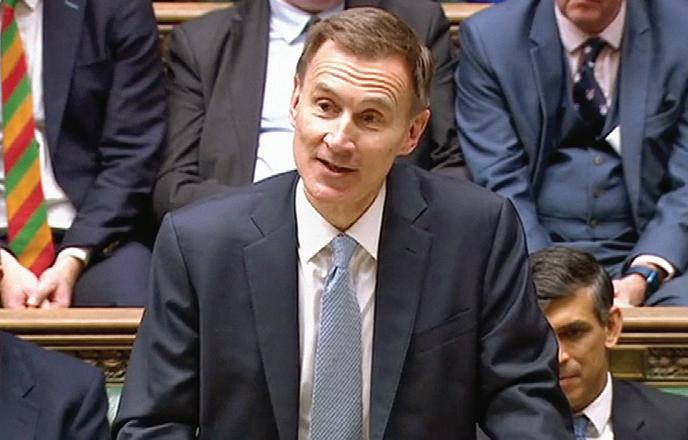




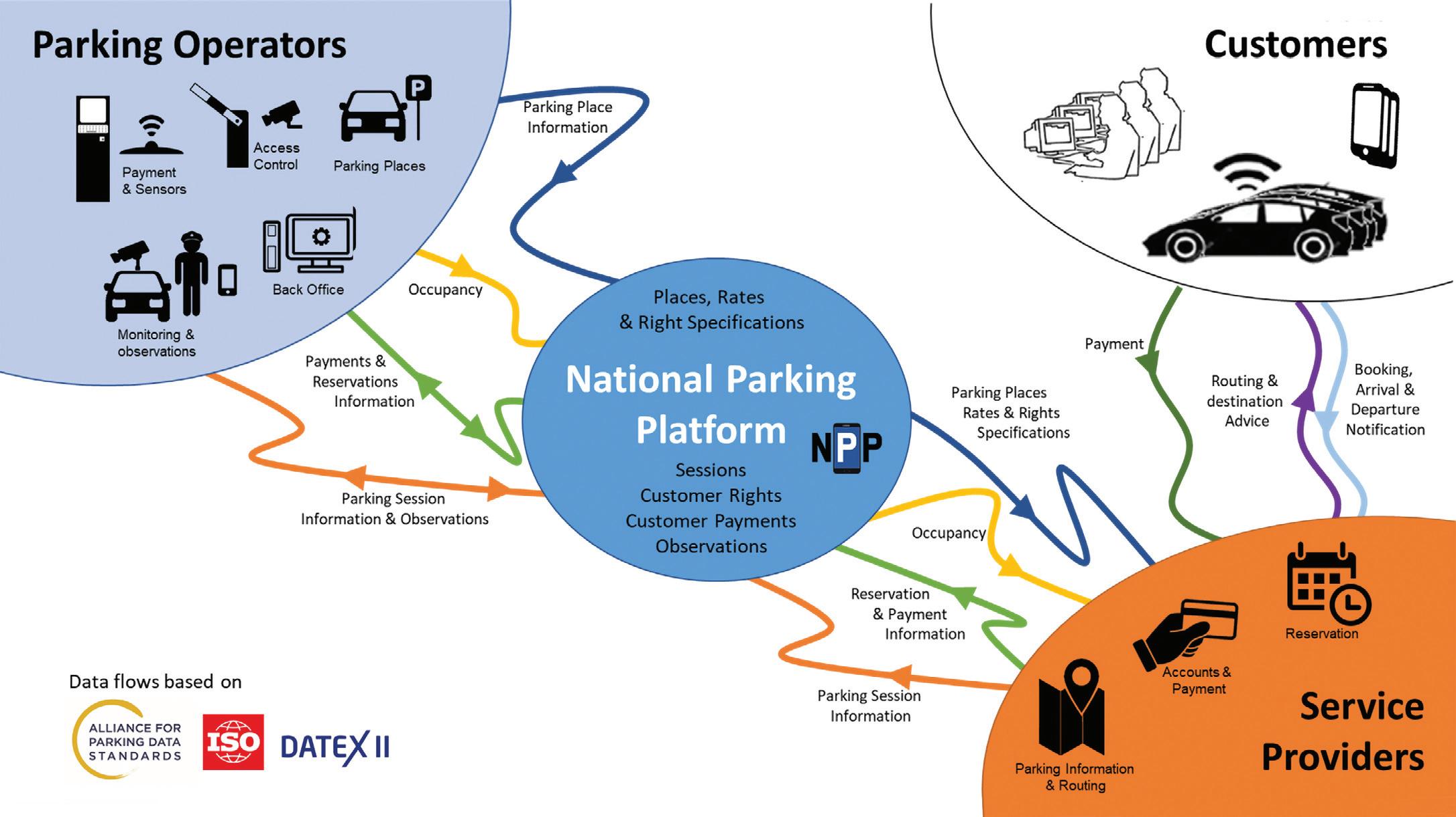
The Department for Transport is encouraging local authorities, operators and payment service providers to join the National Parking Platform
Pay-by-phone and pay-by-app services have been a growing part of the parking ecosystem since the 2000s. Users appreciate the opportunity to pay without cash and without having to visit a machine. However, when these services first emerged, no effort was made to organise how they worked together. As a result, the system has been organised through a series of procurements by local authorities and others. This means councils tend to be tied to a single app by contract and drivers travelling around the country must contend with multiple apps. This is set to change. The act of paying for parking by app will become simpler for motorists if the Department for Transport (DfT) fulfils its ambition of launching the National Parking Platform (NPP) this autumn.
The platform is not an app, but a hub that makes every participating app work for every participating parking space. The NPP will allow drivers paying for parking to use their choice of app rather than whatever app with which the parking provider has signed an exclusive contract. The NPP aims to improve the customer journey across the full range of on-street and off-street parking. This publicly owned platform is open to public and private parking operators as well as service providers.
Customers will be able to locate suitable parking for their journey, check tariff and availability, pre-book a space and make payment through the NPP, before starting their journey, or modify that journey as conditions change to use alternative parking.
Advocates of the National Parking Platform argue that it will provide the foundation for an open market which allows multiple phone parking providers to operate alongside each other. It is hoped that will encourage competition and enable motorists to choose their preferred parking app.
Micheal Dnes, head of future roads technology at the Department for Transport, said: “The existing system increased the popularity of cashless payments, but it was never designed to work together.
There was a realisation that, with the NPP, we could ease a lot of drivers’ frustration with mobile payment. There is an added value for local authorities and service providers because they will not have to go through protracted procurement processes.
“The NPP allows service providers to be quite different companies in how they work. For example, they could develop an app that allows disabled people to park more easily up and down the country, which is the kind of thing that is only really possible when you join the market together.”
Currently, contracts for pay-by-app services fix how much each local authority and service operator can make from each parking transaction. The move to the NPP replaces this direct relationship with an open market. Based on conversations with councils, the NPP team at the DfT understands that the top priority of local authorities is control and stability of revenue. The NPP records the numbers and values of transactions and manages payments.
Early access membership
Designed for parking providers wanting immediate access, especially if an existing contract is ending. Early access allows immediate unlocking of NPP services (including multi-vendor payment) through existing technical systems and contractual structures. This system converts automatically to full membership once it is available.
Full membership
Intended for parking providers wanting to offer multi-vendor cashless payment through the NPP from late 2024 onwards. This provides all NPP cashless parking services.
Associate membership
Designed for parking providers locked into an exclusive contract but eager to leverage some NPP features. Associated members share parking data through the NPP, receive standard location codes for parking sites and are prepared for full membership without further technical set-up when the time comes.
Local authorities will receive their revenues in a regular single payment consolidating what different service providers owe.
Local authorities will set a ‘wholesale price’ that all apps must pay to use the parking. The question of how this relates to an onstreet price would be for the local authority to decide. The NPP charges a small fixed fee to cover its costs. Apps can charge a convenience fee to their customers as they judge fit in the context of what will be a competitive market.
The NPP will charge a fee of approximately 2p per transaction, which is expected to be offset against wider market efficiencies.
Transport secretary Mark Harper announced that the NPP would be live by autumn 2024 when announcing his Plan for Drivers at last year’s Conservative Party conference.
The National Parking Platform has been in development for a number of years. The Department for Transport has backed a series of pilot projects coordinated by consultancy Parking Matters. The pilots have tested the platform concept in partnership with a number of local authorities, private parking operators and a variety of payment service providers.
In order to work, the platform now requires parking providers to sign up. To encourage adoption of the scheme, the Department for Transport has waived the £10,000 joining fee for any local authority that registers its interest in joining the NPP by 31 March. The DfT’s Micheal Dnes said: “Making an expression of interest is essentially agreeing to join the NPP mailing list so that the department knows who to get in touch with. There is no obligation to join off the back of that, and no pressure to have anything in place by a given time.
“The financial model of the NPP is based around the transaction fees paid by users. As a local authority coming on to the system for cashless parking, there isn’t a bill to pay. It all gets worked out before it reaches the balance sheet.”
There are three different levels of membership: ‘early access’, ‘full’ and ‘associate’. These have been built around a recognition that local authorities are in different places with regards to contracts held with cashless parking service providers.
“Some local authorities are raring to go. Early access membership is designed for them because we can get them up and running as quickly as possible using their existing systems, similar to what we have done with the pilot projects,” continued Dnes.
“Full membership is for those that wish to sign up to the NPP when we have the complete national platform functionality later this year. The third level is associate membership for councils looking into a contract, so they can still access some of the benefits, such as getting their data into the system, and can be ready to switch to the full system when they are ready.”
By the start of February some 162 local authorities out of the UK-wide total of 382 had expressed an interest. Private parking operators are also being encouraged to join the platform. Five payment service providers are reported to have signed up, as have a number of back office providers.
The NPP is an ecosystem that extends to parking enforcement providers who ensure compliance with regulations, equipment manufacturers who are integrating payment systems to enable pay on arrival and departure and data analyst looking to use the feeds from the pilots to create new dashboards and toolkits.
The NPP’s first task is to simplify cashless parking, but its infrastructure is designed to do more, says the DfT. Future phases of development are expected to include EV charging, managing residents’ parking, or a one-stop-shop for drivers paying existing road tolls or charges, without having to struggle with new apps or accounts every time. The government says this lays the groundwork for future vehicles to handle parking payments for themselves, paving the way to truly effortless parking. Because the National Parking Platform brings data and information together, the DfT predicts that it could also support local traffic management functions and provide live information on matters such as parking availability. https://npp.org.uk
Local authorities that have adopted the platform

The UK government is planning to introduce the National Parking Platform this year, so the Department for Transport is currently building an infrastructure that enables systems tested in the pilots to operate at the scale required to manage the nation’s parking. The NPP pilots built and tested the links necessary to make the NPP function.
Having started in central Manchester in 2021, the NPP pilot has now rolled out to further locations to confirm that the concept is able to scale up. The local authorities which have piloted or signed up for the platform so far include Manchester, Buckinghamshire, Cheshire West and Chester, Coventry, Peterborough, Oxfordshire, Sutton and Walsall.
Over 125,000 parking transactions are now handled through the pilot every month using four parking payment apps.
Unveiled by transport secretary Mark Harper at the Conservative Party’s 2023 conference, the Plan for Drivers seeks to re-shape the way in which traffic and parking policies are implemented and managed. The plan sets out to improve the experience of driving and services by delivering:
• smoother journeys
• stopping unfair enforcement
• making parking easier
• cracking down on inconsiderate driving
• helping the transition to zero emission driving.
Harper said the Plan for Drivers will make it easier for drivers to pay for parking by rolling out the National Parking Platform by autumn 2024, ending the need to use multiple parking apps.
The Plan for Drivers also suggests digitised traffic regulation orders (D-TROs) will help easily identify where it is legal to park anywhere in the country.
The plan also sets out a commitment to support the provision of public electric vehicle charging infrastructure.
The transport secretary said he hoped to achieve these aims by curbing the blanket imposition of measures such as 20mph zones and low traffic neighbourhoods. There was a pledge to consult on revising guidance about the public’s right to challenge local authority parking policies.
Nottingham City Council used its parking and fines system as a “cash cow” within a “commercially driven culture”, a report by auditors has suggested. Accounting firm Ernst and Young (EY) was commissioned to review the council’s books after unlawful spending from the Housing Revenue Account was uncovered in 2021.
EY looked at how Nottingham managed its finances after it emerged that during 2021 that funds intended for council housing and tenants had been wrongly and unlawfully transferred to the authority’s general fund over several years. The report looks at three financial years from 2019-20 to 2021-22.
The EY report identified a number of “significant concerns” within the council’s control environment, as well as “ineffective systems and associated management information and a culture which is not focussed on the value of compliance”.
The report focussed on six key areas: licensing, better care fund, capital, transforming cities fund, dedicated schools grant and parking enforcement.
EY said: “Four of the six areas were identified as having a medium risk of management override of controls being prevalent within the arrangements within each area. One area, namely parking, traffic regulation and bus lane enforcement was identified as having a high risk of management override of controls. Whilst this area encompasses spend of a much less material value than other areas in scope, it nonetheless represents a significant risk contributing to challenges in Nottingham City Council providing adequate financial stewardship within the financial activities that are in operation within this area.”
Following conversations with parking team staff, EY said: “Interviewees said that historically the council has been commercially-driven and set income targets for the enforcement team, contra to the regulatory guidance; it was commented that the corporate centre has treated this division as a ‘cash cow’.”
EY also noted: “The council received £5m from central government for lost car parking during COVID-19 but that the enforcement team did not receive any of this money and it is not clear how it was used.”
By way of contrast, the city’s workplace parking levy, which has generated £90m over 10 years, was identified as a scheme in which there is better transparency regarding use of funds. EY felt this is due to the license being clearly linked to delivery of the Local Transport Plan.
The council had initially refused to publish the full report despite requests under the Freedom of Information (FOI) Act, but was ordered to make them available by the Information Commissioner’s Office (ICO).

Replying to the publication of EY’s full report, the council said: “As part of the council’s Finance Improvement Plan, an external assessment was commissioned to look at historic compliance with accounting controls for ring-fenced funding over three financial years from 2019-20 to 2021-22.”
The council continued: “The assessment identified significant weaknesses that needed to be addressed to provide the necessary level of assurance, including a weak control environment, ineffective systems and a culture which was not focussed upon compliance. A report taken to the council’s Audit Committee provided a comprehensive summary of the issues raised by the assessment and the urgent action needed to make the necessary improvements.
“It is important to be clear there is nothing specifically identified within the samples tested in the assessment that suggests any allocated funds have been misspent or funding has not been used for
its overall intended purpose. The council took the view that the full assessment report was of a technical nature designed to support the work of professional officers. The Information Commissioner made clear that the council had legitimate concerns around the disclosure of the full report and that it had engaged the exemption not to publish correctly.
“However they decided that on balance, the public interest outweighed the exemption in this case. The council has been open about the nature and seriousness of the assessment’s findings. Good progress has been made to address the issues raised and through the council’s Finance Improvement Plan, reported at every Audit Committee, to ensure the necessary controls are in place.”
On 23 February, the government appointed commissioners to oversee Nottingham City Council, which was issued a section 114 notice in November 2023 citing a general fund pressure of £57m.
Nottingham City Council was ordered to release an independent assessment into its finances by the Information Commissioner’s Office (ICO) following a Freedom of Information request by the Local Democracy Reporting Service (LDRS).
The Labour-run council had refused to publish the full report despite numerous requests under the Freedom of Information (FOI) Act, saying there was a need to consider what it described as a technical report for officers in a “safe space”.
The LDRS appealed against the decision to the Information Commissioner’s Office, which ruled in favour of publishing the
report in January, six months after the initial FOI request was submitted.
The Information Commissioner said: “Having considered the relevant evidence, whilst noting the council’s legitimate concerns about disclosure, the commissioner considers that, in this case, the very unusual circumstances mean that there is an enhanced need for transparency and accountability regarding the council’s financial governance. He considers that the public interest in disclosure, therefore, outweighs that in maintaining the exemption.”
The full documents were subsequently published on 5 February.
‘ White flag is being waved on vehicle theft’
Office for National Statistics (ONS) figures show an 8% annual increase in vehicle thefts.
According to the ONS’s latest Crime Survey for England and in January, instances of “theft or unauthorised taking of a motor vehicle” increased from 122,423 in the year October 2021 to September 2022, to 132,489 in the year October 2022 to September 2023. This represents an 8% year-on-year increase and a 17% increase on the pre-pandemic year to March 2020.
Catherine Grant, lead analyst at the ONS, identified the rise in car thefts as a standout trend, saying: “We’re seeing a mixed picture of crime across England and Wales, with some offences on the decline and some on the rise. The crime survey is showing a decline in fraud compared with the previous year. However, police recorded crime is showing notable increases in some theft


offences, including shoplifting. There has also been an increase in the theft of motor vehicles, which is shown in both survey and police recorded crime data.”
Peter Swift, technical director of Motor insurance loss adjuster, Claims Management & Adjusting (CMA), said the results are unsurprising because of a complacency around car crime. “We have waved the white flag on vehicle theft and can only hope that these awful new government figures prompt some urgently needed action,” said Swift.
“We enjoyed historically low levels of vehicle thefts in England and Wales for a while – from a high of around 400,000 a year


in the 1990s (during the socalled ‘joyriding epidemic’) –down to only 70,000 in 201314. Car manufacturers did an amazing job improving security, largely designing out opportunist thefts. Then, theft numbers began creeping back up, as organised criminals took advantage of high vehicle values and a seeming inattention to the crime. Today, post-pandemic, the picture is getting substantially worse year-on-year.”
Swift, a former detective, said that by 2019 car theft numbers were well over 100,000 a year again. With industry and consumer concern mounting, the Home Office established the
Vehicle Theft Taskforce (VTT). He said: “The VTT was attended by representatives from the Home Office and the Department for Transport, motor and insurance industry groups, and someone from the Office of the West Midlands Police and Crime Commissioner, which claimed to be ‘spearheading’ the initiative.
“A lot of the right people were there. They ‘noted the recent rises in vehicle theft’ provided a detailed ‘overview of the threat’, proposed an ‘action plan’, and agreed to meet every six months. Just one problem: that 2019 meeting was the only time the VTT ever met, and it appears nothing replaced it.”
Five years later, the number of vehicle thefts has soared and the successful recovery rate has dropped to 23% or less, down from 80% in 2006. Swift said: “Crooks now consider car theft an easy win – highly lucrative with a low risk of capture, and lenient sentencing even if caught. Re-establishing the VTT and funding it properly would be a big step in the right direction.”






British Parking Association has worked with operators and airports to
The British Parking Association has launched the Approved Meet and Greet Parking Operator Scheme, known as AM-GO.
The BPA has worked with its members, major airports and key stakeholders to deliver a scheme which the association hopes will become the recognised and trusted standard for airports and off-airport meet & greet parking operators. The association said it has consulted closely and gained valuable insight from members of the Independent Airport Parking Association (IAPA) and meet & greet operators who are BPA members.
The new BPA Approved Meet and Greet Parking Operator Scheme (AM-GO) is designed to complement the Safer Parking Scheme, which is managed by the BPA on behalf of Police Crime Prevention Initiatives (Police CPI) and is aimed at reducing crime and the fear of crime in car parks.
The AM-GO scheme will include regular audits of consolidators, booking agents, meet & greet operators, and airports against the AM-GO code of practice.
The BPA’s team of area managers and Designing Out Crime officers will conduct in-person site assessments of all meet & greet services managed by airports and operators, including every single facility where vehicles are parked and stored for the duration of a customer’s booking.
The AM-GO scheme will ensure that:
• Airports have designated, clearly marked and signposted meet & greet drop-off and pick-up zones.
• Meet & greet staff, including drivers, will be qualified, professional and fully insured, and will carry ID cards and wear uniforms at all times.
• Vehicles will be safely stored in a Park Mark accredited facility and cars won’t be
The International Parking Community has launched an accreditation scheme for companies offering meet & greet services at airports.
The IPC Accredited Airport Meet and Greet Provider certification scheme has been developed via engagement with both domestic and international airports, meet & greet providers and other interested parties, with additional research into common motorist concerns.
The IPC says that for a long time, airports and reputable meet & greet providers have been having issues with rogue providers. From vehicles being returned to their owners
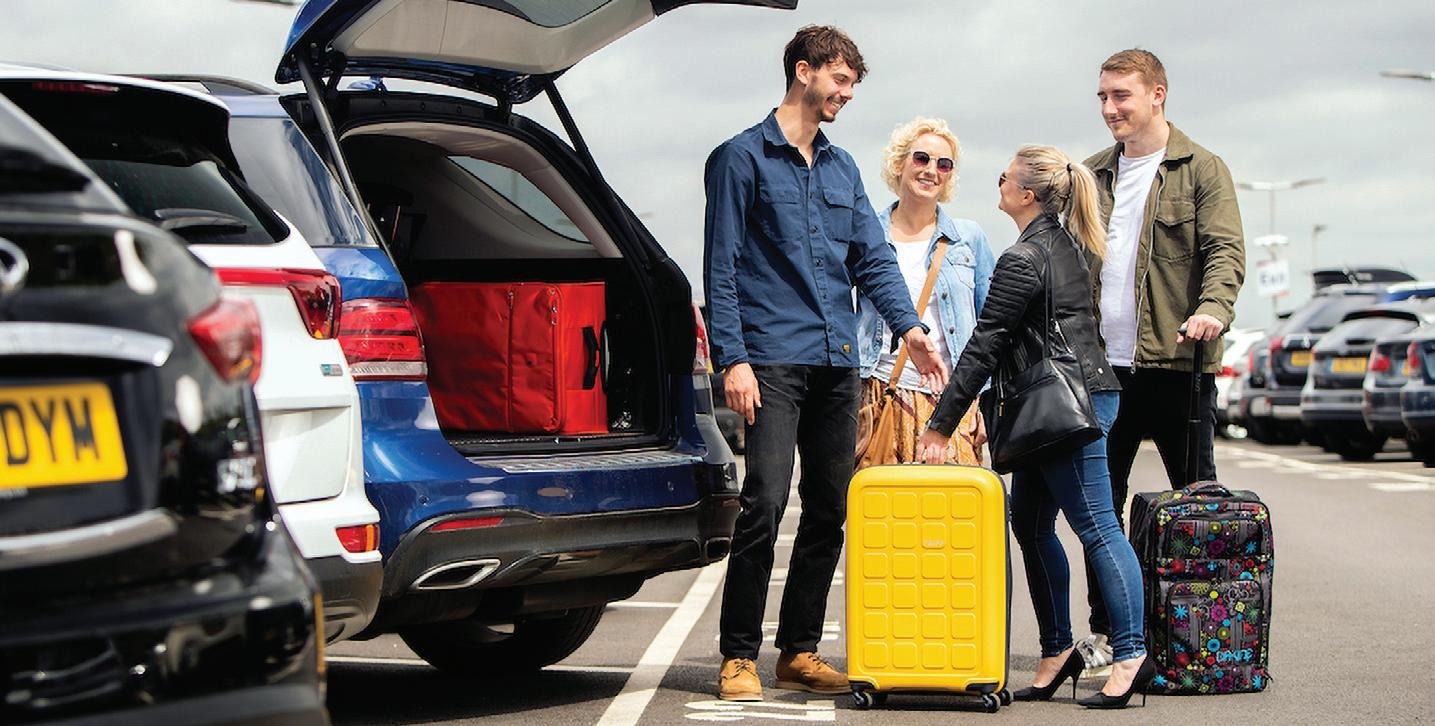

driven any further than stated on the booking confirmation.
• Both airports and AM-GO members will be regularly assessed and monitored by BPA qualified auditors to uphold standards.
• Motorists will be signposted to a single, reliable data source for AM-GO members and can be confident of leaving their vehicle with an Approved Meet and Greet Operator.
The BPA will also mediate on any escalated motorist complaints. Sanction points will be levied and, where appropriate, failing operators will be removed from the scheme.
The BPA has developed new Trading Standards policy to prevent logo misuse. The policy has been devised with the support of Police Crime Preventions Initiatives.
Sara Fisher, BPA head of operations and business development, said: “We are so excited to be launching this new scheme which will be the only police supported nationwide accreditation of its type. We are aiming for a national standard to deliver optimum success and a consistent message to the holiday and business traveller alike, so we are encouraging all UK airports and their meet & greet parking operators to join the scheme. It is hoped that the new standard in airport meet & greet parking can help

make rogue and unscrupulous opera tors a thing of the past. In the future we want to confidently say to consumers: ‘Don’t book your airport meet & greet parking with anyone else’.”

The BPA will be contacting all UK airports over the coming months and the new scheme will be operational before the summer holiday season in 2024. Fisher said: “We have exciting plans for a major launch and have been working closely with airports to strategise this. We will be calling on the power of local police communications channels and our excellent relationships with the media too. Watch this space!”
When asked about the recent launch of a separate meet & greet accreditation scheme by the International Parking Community, the BPA responded: “As a not-for-profit association, our aim is for one, police supported nationally recognised standard which is trusted by both the motoring public and the sector for its rigour and integrity but most importantly, achieves positive results for everyone involved.”
For information email: meetandgreet@britishparking.co.uk
damaged, or with excessive mileage, to vehicles being left in residential areas causing traffic chaos, or vehicles being used to facilitate crime. Having a provider that is behaving unlawfully can cause issues to customers and cause reputational damage.
Compliance against the scheme will be assessed via a combination of information uploaded to the IPC portal and in person inspections and regular audits. The scheme will ensure providers are operating within the scheme’s framework, covering topics such as insurance, personnel, site regulations and vehicle
management processes.
Accredited providers will then be subject to scrutiny to ensure the services they offer continue to meet the requirements of the scheme, and therefore the requirements of passengers.

The scheme will be marketed to the public using a recognisable badge that will be displayed by the airport and the certified providers. Additional campaigns will be launched via social media, press and online. Airports themselves will market
the scheme directly to their
When asked what it thought about the launch of a parallel scheme by the BPA the response was:
“The IPC feels very positively that the industry is working to raise standards. The Meet and Greet Provider certification scheme will help to ensure that motorists receive a high standard of service, and airports can be confident of high standards. While we are proud to be the first, we applaud the hard work of the entire industry to raise standards and work towards a common goal.”
theipc.info/MeetandGreet

A citywide crackdown on Blue Badge fraud in Edinburgh has seen several stolen and misused badges seized and cars impounded.
The City of Edinburgh Council initiative is targeting areas where Blue Badge misuse has been reported. This includes the use of lost or stolen badges or those that belonged to a deceased person, and the misuse of badges belonging to family members by relatives who are not eligible to use them.
Blue Badges allow people with mobility issues to park more conveniently and free of charge in pay & display and shared use on-street parking bays, on single yellow lines when loading is allowed and in disabled person’s parking places.
Over two days of focussed action in recent weeks 16 parking tickets were issued and seven cars impounded for displaying lost, stolen or misused badges, which were taken from offenders. Where car owners were family members using Blue Badges without the badge holder being present, badges were confiscated and warning letters issued to holders, who could face losing their Blue Badge as a result.
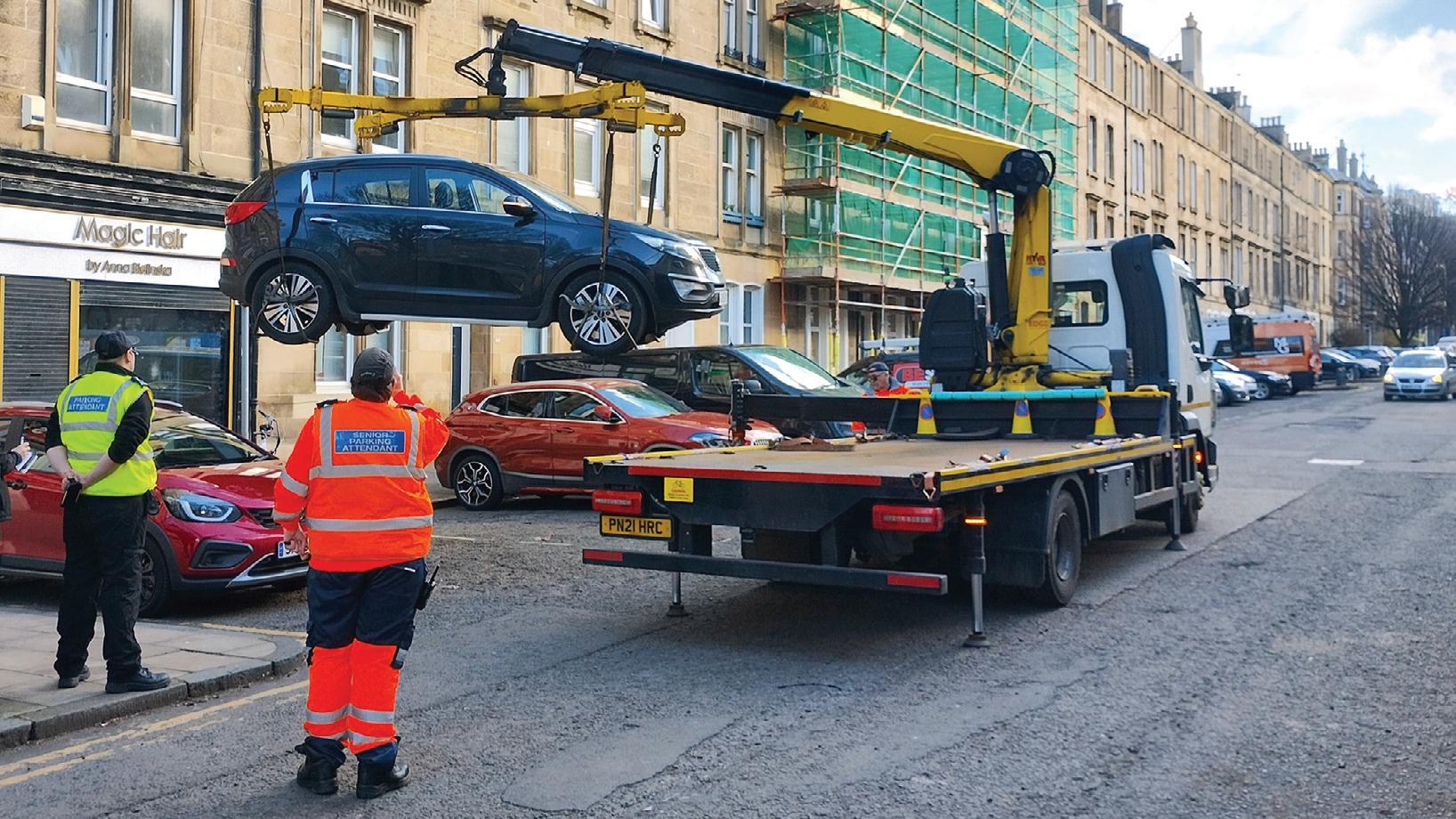
The city council worked with parking contractors NSL.
Cllr Scott Arthur, transport and environment convener, said:
“Using a
it’s lost, stolen or that of a family member, is
Ealing Council’s parking enforcement officers were out and about across the west London borough tackling nuisance parking on a Friday night. The team of officers, supported by Ealing’s community safety service, Parkguard, are patrolling problem areas in Southall and Northolt.
Officers have focussed on garages and vehicle traders who use the public highway as personal storage space in an unlawful manner, with a total of 20 vehicles removed from the streets. Vehicles have been removed because plates were missing.
The officers have recorded extensive body damage that rendered a vehicle not road worthy, severely expired tax or vehicles registered as statutory off road notification (SORN), meaning it should be kept in a garage and not on the road. In one case, the rear plate on a van did not match the front plate.
Officers have also issued 41 penalty charge notices (PCNs) for various offences including parking on zigzags and double yellow lines.
A school parking management scheme has been introduced in Worcester after a child was struck by a car. Parents of pupils at Stanley Road Primary School will be able to use the Tallow Hill Car Park as a dropoff and pick-up point while on the school run.
Worcester City Council described the scheme as a temporary measure to support the school with the parking challenges it faces. The offer will be available to parents for an hour at each end of the school day.
A campaign for better road safety around the school was launched after a six-year-old boy was injured in November. West Mercia Police said the boy was expected to make a full recovery.
Headteacher Lorraine Adams
said: “Many of our parents drop their children off on their way to work and usually struggle to find somewhere close but safe to park. This will definitely reduce the number of cars parked on Stanley Road whilst our parents and children are coming backwards and forwards to school and therefore their journeys to school will be safer.”
A city council spokesman said: “This offer does not constitute free parking. It is solely for parents to drop-off and pick-up their children from school. This situation will be kept under review and we will be closely monitoring the car park to ensure this interim arrangement does not inconvenience our paying customers. Any misuse may result in removal of the offer.”

fraud. Doing so doesn’t just break the rules that everyone else adheres to, but it takes away much-needed spaces for those with mobility issues. It is a fundamentally selfish act.
“While it’s only a small minority of people that misuse Blue Badges, there’s still a problem. That’s why I hope the action being taken by our parking and fraud teams sends a clear message – Blue Badge fraud will not be tolerated.”
The council plans to continue proactively targeting Blue Badge fraud to stop perpetrators abusing the parking system and to improve accessibility for those in genuine need of parking spaces.
People taking children to and from school in Portsmouth will be made safer, as the council has increased enforcement of cars stopped on ‘Keep clear’ markings outside schools.
Portsmouth City Council has installed automatic cameras to identify vehicles that have stopped on zig-zag markings outside schools, in an effort to make it safer for children and families to get to and from school.
Automatic cameras are located at seven sites in Portsmouth and can detect whether a vehicle is stopped on entrance markings outside schools.
If a driver is found to be stopped on one of these ‘Keep clear’ zig-zag markings, the system will automatically create a case for a civil enforcement officer (CEO) to review.
If the CEO believes that a parking
contravention has taken place, the registered keeper of the vehicle will be sent a penalty charge notice (PCN) by post.
The cameras are useful as they allow the council to ensure more people are kept safe without a CEO needing to attend, and signs outside schools highlight that camera enforcement is taking place.
This means that more schools can be covered by either a CEO on-site or a camera, leading to children and families being able to travel to and from school in safer ways.
Cllr Gerald Vernon-Jackson, cabinet member for transport, said: “It is disappointing to see people ignoring the zig-zags outside schools and parking on them during school hours. This behaviour has driven us to take more action to keep children safe at more schools with an increase in enforcement activity.”

















Secure parking will be among benefits of truckstop upgrades
Truck parking facilities across England are set to receive £16.5m worth of improvements, including more parking spaces, better welfare facilities and safer rest areas. Some 38 truckstops across England will invest £6m from the Department for Transport (DfT), with a further £10.5m coming from industry.
The upgrades will include new showers and restaurants, as well as better lighting and secure fencing around rest areas so drivers can feel safer and sleep with greater peace of mind. The measures will also create around 430 new parking spaces for heavy goods vehicles (HGVs) to free up local roads.
The improvements will also help decarbonise the haulage sector by installing new chargepoints to power electric HGVs and solar panels on lorry driver facilities to make them as sustainable as possible.
The measures follow £15m in joint government and industry funding for similar improve-


ments announced in September last year as part of the fund’s first application window. This takes the total joint investment from the department and the sector to improve lorry roadside facilities to up to £31m.
Roads minister Guy Opperman said: “Our lorry drivers are the backbone of a successful economy, ensuring food, goods and crucial medical supplies can get where they need to be, all over the country.
“That’s why it’s only right we leave no stone unturned when it comes to supporting our lorry drivers as part of our plan to grow the economy, and today’s
£16.5m in joint government and industry funding will provide them with the safe, spacious and modern facilities they deserve.
“The new investment comes from the government’s HGV parking and driver welfare grant scheme, a joint investment between government and industry to support the haulage sector and provide lorry drivers with modern, secure facilities all across the country.
“The scheme draws on the national survey on lorry parking, 2022, which provides important evidence as to what improvements are needed and where to
Half of UK truckers have considered quitting the job, says University of Oxford survey
The UK’s heavy dependence on trucks and their drivers became clear in the wake of Brexit and the COVID-19 pandemic with empty shelves and petrol pumps across the country. To avoid repeated supply chain disruption, it is critical that truck drivers are recruited and retained. But a report from the Trucking Lives project provides new evidence of the challenges truck drivers face and reasons why they are looking to leave – or have left – the job.
Over half of current truckers said they had thought about quitting HGV driving in the previous year. Some 2,000 truckers cited discrimination at work, poor facilities including lack of toilets and inflexible working patterns as reasons for leaving the freight haulage sector.
The Trucking Lives project is a three-year research programme funded by the UKRI Economic and Social Research Council (ERSC), part of the Transforming Working Lives portfolio. It is led by the University of Oxford and focusses on understanding and highlighting the everyday work and life experiences of the UK’s HGV drivers.
The Views from the Cab report shows
that there are high levels of discrimination experienced by HGV drivers. This reflects social and professional devaluation.
A third of HGV drivers had experienced discrimination at work, for age and gender or simply ‘for being an HGV driver’.
Half of female HGV driver respondents had experienced gender discrimination at work.


Lead author of the report, Dr Debbie Hopkins, said: “We need to challenge the ways the public and the logistics sector view and treat HGV drivers if recruitment efforts are going to lead to long term workforce stability and prevent supply chain failures.”
The way that truck drivers are viewed and treated is reflected by the low-quality services they are provided with, says the report. Truck drivers are repeatedly denied access to comfortable waiting areas, clean toilets and showers and affordable food.
The Views from the Cab research also shows how the organisation of HGV driving work fails to account for the driver’s needs.
boost the nation’s roadside infrastructure. With hauliers required to take mandatory breaks and rest periods, building better roadside facilities will improve the quality of HGV drivers’ rest and recovery, ensuring everyone can feel safe on our roads.
“Britain’s roads are already among the safest in the world and the government is committed to helping the sector improve driver welfare, boost drivers’ security and continue to guarantee road safety.”
Declan Pang, director of policy and public affairs at the Road Haulage Association (RHA), said: “We are delighted to see the government’s match funded grant scheme being awarded to projects which will make a tangible difference to the experiences of lorry drivers and provide much needed additional parking capacity to address the well-known shortage of spaces.
“We are pleased to see facilities operators contribute funding and commit to improving security and conditions at the sites they operate. We look forward to seeing the positive impact the funding will have across the range of projects.”
Long working hours and rigid schedules remain dependent on inflexible work arrangements. Just 1.5% of respondents were working in a company that provides working arrangements that are standard in other sectors (e.g., part-time, flexitime and job-share).
While recruitment drives have attracted new people into the sector, the Views from the Cab report shows that retaining a diverse workforce of HGV drivers to ensure long term supply chain resilience will require more fundamental changes to how their work is configured and how this workforce is valued.
Dr Hopkins, principal investigator of Trucking Lives, added: “For too long there has been an expectation that HGV drivers will tolerate appalling working conditions because they are committed to the job they do.
“All workers deserve to be treated with respect and have work conditions that reflect this. HGV drivers provide a critical service that we all benefit from. But their job involves long hours and time away from family and friends. To sustain this workforce, business and policy decisions need to reflect not just business demands of logistics but also the needs of workers.” www.truckinglives.co.uk
Digital transformation through technical innovation, driving efficiencies and improved compliance.
Instant Efficiency
VRN scans and real-time contravention alerts
Geotargeted Alerts CEOs patrol smarter, not harder
Strategic Insights
Powerful dashboards guide intelligent enforcement
Fully Operational
Scalable, feature-rich technology
Proven Globally
Trusted in major cities across the UK and Europe

Discover how Egis’ dispatch technology can work for your Local authority - schedule a no-obligation demo with one of our experts today.
nigel.coltman@egis-group.com
gavin.manager@egis-group.com
www.egis-group.com


Avideo published on Coventry City Council’s social media channels has shown the ferocity of abuse faced by frontline parking staff. The video captures an incident where two civil enforcement officers are verbally and physically assaulted by a member of the public. The two civil enforcement officers (CEOs) were patrolling Victory Road and ticketed cars that were illegally parked. When a member of the public saw a ticket on his van, he became verbally abusive towards the officers, then physically assaulted one of them by throwing him to the ground.
The video, which can be viewed on the council’s YouTube channel, was captured by one of the body cameras that are worn by all the city’s CEOs.
The bodyworn cameras were introduced about six years ago. In many cases they act as a deterrent and help reduce cases of aggression towards officers, but they can also capture audio and video footage that can be used as evidence by the council or police to assist with investigations and prosecutions.
The city council said the case is just one of many incidents of assault and abuse against CEOs, with an increased number of incidents being reported in 2023. Male and female officers have been violently attacked, including being punched, kicked and spat at and being driven at by speeding vehicles. They have also had full drinks bottles and cans thrown at them, as well as liquids, eggs, and even a road sign.
The video has been published as part of an ongoing council campaign called ‘No excuse for abuse’ that aims to cut down on violence against staff.
Cllr Abdul Salam Khan, deputy leader of
Coventry City Council, said: “Council staff work hard every day to support the people of our city and we know that is appreciated by most people, but sadly cases of abuse are rising, and this cannot be allowed to continue. There are too many incidents where some people cross the line and become abusive, as in this case where two officers were simply trying to do their job and help residents.
“Abuse in any form against council staff will not be tolerated and legal action will be taken. We are there to help and support residents and we thank the vast majority of those for the way they work with us, but the message to the abusive minority is now clear – we will inform police and we will look to prosecute where possible to protect our staff.”
The CEO, who wants to remain anonymous, told the BBC he said he felt let down by the police response. Despite an emergency call, he said police did not attend and the person who attacked him was never arrested or spoken to.
The CEO said his experience of violence
job. In the days that followed, the victim visited police to file a report, but said he was never contacted for a statement and was later told the case was out of time. “I felt disappointed to be honest,” he said. “We had body footage on our bodycams; we knew where the person lived. We had the details of the person’s vehicle. The person was never arrested or spoken to about it.”
The CEO said he previously reported other aggressive incidents to police, but no action was taken. He said: “I don’t have a lot of faith in the police helping us. I do feel more and more let down by the people who can actually make a difference.”
A West Midlands Police spokesman said: “We received a report of a council worker being assaulted in Coventry on 23 June last year. Officers investigated, but unfortunately the investigation did not identify a suspect. This was communicated to the victim, who agreed it was the best available option. As a result of new information given to us, we are now carrying out further inquiries.”

Parking operator agrees 12-month deal with cargo bike operator
Q-Park is to host a micro logistics hub in London following a successful trial. Micro logistics hubs are small, secure spaces that couriers and operators can use to receive, sort, and send deliveries in central locations, ideally by cargo bike or walking porters, to support zero-emission lastmile deliveries. They enable the consolidation of deliveries, which advocates say can reduce the number of polluting vehicle trips and congestion, thereby improving local air quality.
The Cross River Partnership (CRP), a non-profit partnership organisation, and Westminster City Council (WCC), announced that following 9-month trial period, Q-Park and low-emission courier Delivery Mates have now come to an agreement to continue to independently operate from the Pimlico hub for a minimum of 12 months. Decarbon Logistics Solutions facilitated

transport challenges. This project exemplifies our commitment to creating a greener, more sustainable economy while supporting local businesses and improving the quality of life for residents.”
the conversations between Delivery Mates and Q-Park UK.
The CRP and Westminsterfunded trial was launched in April 2023. The project was part of the Defra-funded Clean Air Logistics for London (CALL) and Smarter Greener Logistics (SGL) programmes.
The hub is a fenced-off 750 square foot area within Q-Park Pimlico on Cumberland Street. The hub receives parcels from an electric van and then distributes them by electric cargo bikes in the City of Westminster
Jonathan Hampson has been appointed as chief commercial officer at JustPark.
Hampson has worked in the mobility sector for over 15 years, specialising in the intersection of technology and mobility at both start up and scale up organisations.
At Zipcar (initially as Streetcar), he was a core part of the team that really established the car sharing category in the UK culminating in four years as general manager for the UK. He also led Via’s efforts to power the future of public mobility as their regional manager for Northern Europe.
Hampson said: “For anyone who owns a car, parking is a fact of life and we all know it needs to be simpler and easier. This has been Anthony Eskinazi’s mission for nearly
and surrounding areas.
After nine months of operations, the e-cargo bikes travelled total distance of 22,578km (14,029 miles), which led to significant emissions reductions of 4,186 kg of CO2, 15,14 g of NOx, and 303g of PM2.5 when comparing the e-cargo bikes to van deliveries on the last mile.
Cllr Paul Dimoldenberg, cabinet member for city management and air quality, said: “The Pimlico Micro Logistics Hub demonstrates the power of working together to tackle urban
John Denton, head of commercial at Q-Park UK, said: “QPark have been at the forefront of the European parking industry in the creation of mobility hubs. Our aim is to develop parking facilities into vital instruments to help realise urban accessibility, sustainability and liveability. By 2030 we want to be the preferred sustainable mobility hub partner for both the private and public sector. We are therefore delighted that the last mile delivery hub located in our Q-Park Pimlico parking facility is to continue.”
Isidora Rivera Vollmer, CRP project manager, said: “The micro logistics hub trial aligns with our current Defra-funded Smarter Greener Logistics programme, which aims to minimise the impact of freight on noise, air quality, traffic, and pavement space in London.”
APCOA has appointed Nick Pulford as its new interim chief financial officer. He succeeds Sam Groves, who has been CFO since 2021.

18 years now and the progress he and his team have made is impressive – 13 million drivers, 250,000 spaces including 50,000 residential spaces and partnerships with some of the UK’s largest councils and car parking companies.
“What is exciting though is the further potential that exists and I can’t wait to get stuck into helping them realise it.”
Before joining APCOA, Pulford was interim group CFO at assurance experts LRQA. His finance experience includes positions at listed businesses such as WSP Group and AECOM, and more recently in private equity backed organisations.
Philippe Op de Beeck, APCOA’s chief executive officer, said: “We are delighted to welcome Nick as interim CFO. His skills, knowledge and experience mean he is well placed to support the implementation of APCOA’s transformation strategy.
Smart Parking has acquired the parking management contracts and assets of UK operator Local Parking Security (LPS), which manages over 120 sites using a mix of number plate reading camera technology and manual operations.
The 126 sites under LPS management will be added to the Smart Parking
portfolio. Some 72 of the sites are automatic number plate recognition (ANPR) technology managed locations and 54 manually operated sites.
Smart Parking is an Australian-based company operating internationally. The LPS transaction purchase price of around £3m (AUS$5.8m) was funded from existing

“Sam Groves has made a more than significant contribution during his time at APCOA, and I would like to thank him for his partnership and wish him the best in his future endeavours.”
Smart Parking cash reserves.
Smart Parking’s chief executive Paul Gillespie said: “We are delighted to welcome the Local Parking Security team and customers to the Smart Parking Group. Local Parking Security has built a wellrespected parking management business over many years, which has resulted in an attractive and diverse portfolio of sites across the UK.”
AppyWay is fundraising on the Crowdcube platform. The company is seeking to raise £600,000, which would be invested in sales and marketing scaling operations to support a growing customer base as well as preparations to enter international markets.
The company’s systems integrate cashless payments, detailed parking and loading maps, and occupancy data.
Customers include Direct Line, Motability, ARM, BT, Connected Kerb and Motability Operations, as well as a number of UK local authorities including Edinburgh, North Yorkshire, Lambeth and Transport for London
Dan Hubert, founder and chief executive of AppyWay, said: “Recent government legislation on digital roads mandates that all authorities embrace the digital kerbside. Fortunately, AppyWay has spent the past decade building their technology precisely
Les Knight has become business development manager at Hozah Parking.
Knight will be advising clients on the latest tech-based revenue generation and parking management tools designed to get the most from their parking and land assets.
He is a former director of Euro Car Parks and ECP (Holdings), being responsible for sales and strategic management opportunities between 1989 and 2022.
Knight also served as president of the British Parking Association in 2007-08.

for this moment. Today, this unique platform is strategically positioned to capitalise on this digital revolution and scale across the UK and beyond.
“With parking deeply affecting us all on a daily basis now is the perfect opportunity for the crowd to invest in a parking revolution made by the people for the people. Our Crowdcube campaign is an invitation to the public who share our vision of smarter,
Sharon Silcock has been appointed head of sales and business development for Yunex Traffic’s global enforcement portfolio. She will be responsible for the company’s enforcement product portfolio, which ranges from clean air zones to moving traffic offence enforcement.
Silcock will lead sales activities both in the UK and internationally for enforcement solutions and be responsible for managing the company’s enforcement sales team, customers and partners, as well as identifying and developing new export opportunities.
She has more than 12 years’ experience gained in senior sales and business development roles, predominantly in the parking and software sectors. She has worked with both public and private sector organisations in the UK and internationally, working with businesses such as Imperial, Taranto, Unity5 (Zatpark) and the Metric Group.
Sharon Silcock said: “I’m excited to be joining Yunex Traffic and looking forward to working closely with an incredibly talented, committed and experienced group of
more sustainable cities through the digitisation of much undervalued council asset. Your support can help accelerate the development and expansion of our solutions, making a tangible impact on the way we live and move around our towns and cities.”
The public funding offer closes on 27 March.
www.crowdcube.com/companies/ap pyway/pitches/b3jv5Z


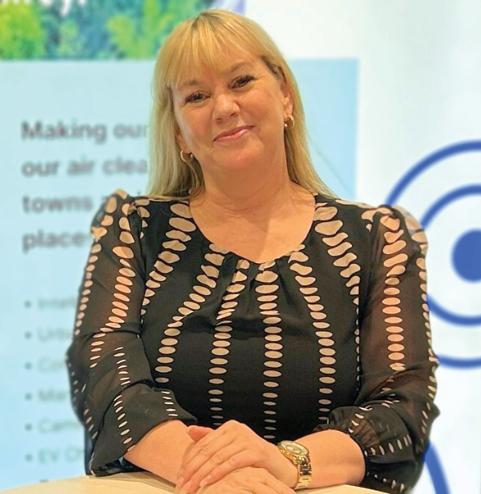
We currently supply and have vacancies around the UK for Permanent and Temporary positions:
• Civil Enforcement Officers
• Environmental Enforcement Officers
• Parking Back Office (Appeals/Notice Processing/Correspondence)
people. We have a great range of systems and solutions which are transforming towns and cities worldwide, bringing air quality and health and wellbeing benefits to the people who live and work there, and operational and efficiency benefits to those who manage the transport networks. I’m looking forward to helping to bring those benefits to more and more cities across the world.”
Greg Allen, director of enforcement and EVCI at Yunex Traffic, said: “I am delighted to welcome Sharon to the Yunex Traffic team. I know her strategic sales and management experience will be a huge asset to the business and will help us grow in our existing markets and develop new opportunities.”
• Parking Change Management
• Interim Parking Managers
• Car Park Attendants/Marshalls/Stewarding
• Parking Supervisors (Both Enforcement and Back Office)
• Parking Management (Both Enforcement and Back Office)
• Heads of Parking/Directors
• Parking Technologies (Business Development and Project Managers/ Field Service Engineers/General Managers)
• Off Street Parking (Business Development, Contract Managers and Regional Managers)
• CCTV Operators – SIA and BTEC qualified
Looking for staff or need employment?
Please contact our experienced team on:
Tel: 0203 668 5680
Email: parking@unity-recruitment.co.uk
Web: www.unity-recruitment.co.uk



















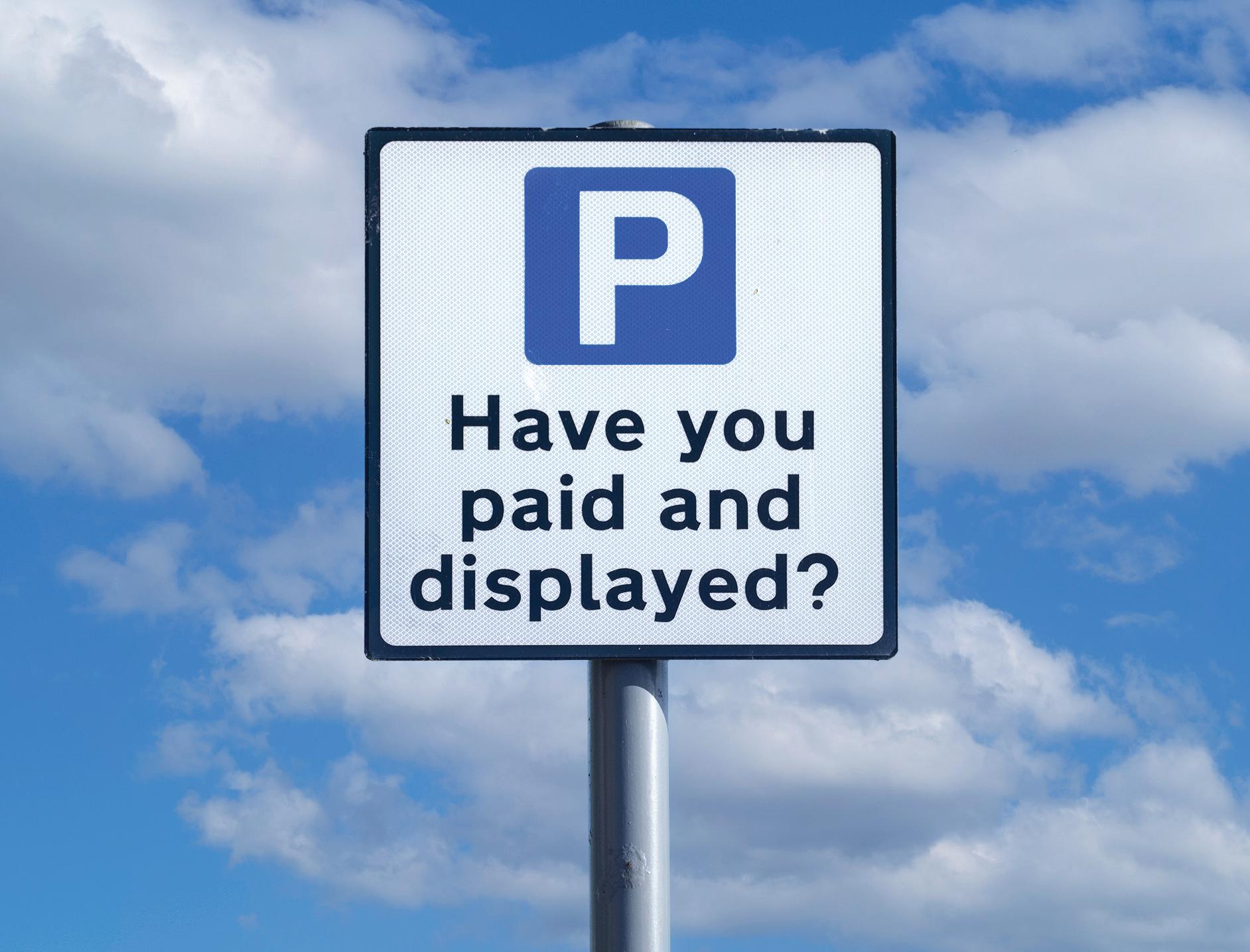

Council parking charges hit the headlines from time to time, but what is the true story of the amounts of income the local authorities receive, and their contribution to local transport expenditures?
Transport economist John Siraut has examined the latest figures and finds a few big income numbers, but also discovers that for many areas parking management and enforcement is a policy issue rather than revenue activity.
Arecent BBC news item on York City Council charging up to £20 for all day parking at some of its city centre car parks seemed to highlight the significance of parking revenues to some councils in these cash strapped times. As often, the underlying belief seems to be that charging for parking is a nice little earner for local authorities, but is that the rule, or the exception?
The latest Department for Levelling Up, Housing & Communities (DLUHC) local government finance returns (Revenue Outturn 2022-23: Highways and Transport Services (RO2) data) sheds some welcome light on the subject, and highlight the very limited number of councils for whom parking is a substantial source of revenue.
Table 1 provides a high-level summary of total gross and net income for on-street, off-street and total parking revenues by council type. The table shows the totals for those councils that we have such data for. DLUHC, in its totals, also estimates revenue from those councils for whom returns are not available and this is shown separately.
Looking at Kensington & Chelsea’s own annual parking report, it would seem that the reported parking revenue to DLUHC covers: parking charges, residents’ permits, parking suspension income, and penalty charge notice (PCN) income.
Using the DLUHC figures shows that in total, councils achieved gross revenues of nearly £2bn from these sources, and net revenues of nearly £1bn after the costs of parking management and enforcement are taken into consideration. These figures do not, however, take account of capital expenditures or depreciation, so are arguably significant over estimates of the true state of net parking income. Alongside this, over half of that net income accrues to London boroughs, and the average level of net income across the other council types comes to just over £3m for unitary authorities, and under £2m for metropolitan districts.
In London, Westminster City Council grosses over £100m from on-street parking – or nearly 10% of total on-street parking revenue for the whole of England. The next highest revenue earners; Kensington & Chelsea, Hammersmith & Fulham, and Lambeth, each bring in only half the Westminster amount, and eight London boroughs gross less than £10m.
So, even in London there are large differences in revenues between councils. London is also unusual in that its on-street revenues are over 16 times off-street revenues. Table 2 shows net total on-street and off-street revenues by London borough. Reinforcing its dominance, it’s worth noting that Westminster earned more than the 12 boroughs at the bottom of the table all added together.
Outside London a very different picture emerges. Of the 35 metropolitan districts we have data for, five appeared to have lost money on their parking operations. Sixteen netted less than £1m while Manchester, with net earnings of £13m and Newcastle with nearly £10m, are the only two major earners. Local authorities will usually have competition from private sector off-street operators, as it is only with on-street parking where they have a
monopoly. Manchester’s gross on-street revenue is considerably higher than for Liverpool or Leeds suggesting a tighter supply of parking in the former, and/or perhaps a more vibrant economy that can support higher charges.
Amongst the high earning unitary authorities, Brighton grosses a substantial £36m, which would put it third in the London borough list, followed a long way behind by Bristol on £12m and Milton Keynes on £10m. Bournemouth, Christchurch & Poole (£21m), Nottingham (£15m) and Cornwall (£14m) were the biggest gross earning unitaries when it came to off-street parking.
In terms of total net parking revenues, Brighton made £30m, Nottingham £15m, Bournemouth, Christchurch & Poole £13m and Bristol £11m. For the second tier shire districts where parking responsibility lies and there are figures reported, the big numbers were with Canterbury, Cambridge and Exeter, who all netted over £5m. At the other end of the scale, of those we have data for, 29 councils reported a combined loss on their total parking operations of almost £4.4m.
Taking all the local authorities together, the on-street market is dominated by London boroughs, with Brighton, the only outsider amongst the top ten gross revenue takers (Table 4.) On the other hand, only one London borough features amongst the top ten offstreet revenue earners, which consist of a mixture of cities, counties and tourist destination areas. When it comes to net revenues, few councils earn more than £20m and Brighton again is the only non-London borough to feature in the top ten. As for York, the subject of that BBC story, parking revenue netted £7m in 2022-23.
Under the legislation that permits the charges, on-street parking net revenue has to be spent on other transport-related activities funded by the relevant council. This may include the provision of electric vehicle charging points and concessionary fares. It is not all positive financially, however, as it’s also worth noting that 50 councils lost nearly £12m in total on their parking operations.
Those critics who claim that charges are just a cash cow might remember too that managing parking is not a guaranteed profitmaker for hard pressed councils. Setting charges meanwhile plays other important roles in transport policy too, often being a valuable tool to achieve wider policy objectives such as dealing with congestion, prioritising roadspace and kerbside allocation, managing the limited resource of parking in residential areas, cutting emissions and supporting the transition to net zero, whilst improving mobility overall and meeting placemaking and environmental goals.
Looking at it another way too, to put some of these parking revenue figures into context, the four largest UK airports grossed £570m in parking revenues according to their latest annual accounts, while National Car Parks, the largest private sector car
park operator, with more than 200,000 parking spaces in over 800 sites, grossed over £170m. These days NCP is now a management company – its freeholds were sold off and its portfolio is mainly leases.
A final fact. For local authorities alone, the gross revenue parking figures equate to collecting average parking charges of around £60 a year for every car and van registered in England.
John Siraut is director of economics at Jacobs.
Email: john.siraut@jacobs.com

Reference
All data is from Department for Levelling Up, Housing & Communities, Revenue Outturn 2022- 23: Highways and Transport Services (RO2). https://www.gov.uk/government/statistics/local- authority-revenueexpenditure-and-financing-england-2022-to-2023-second-release/localauthority-revenue-expenditure-and-financing-2022-23-outturn-englandsecond-release
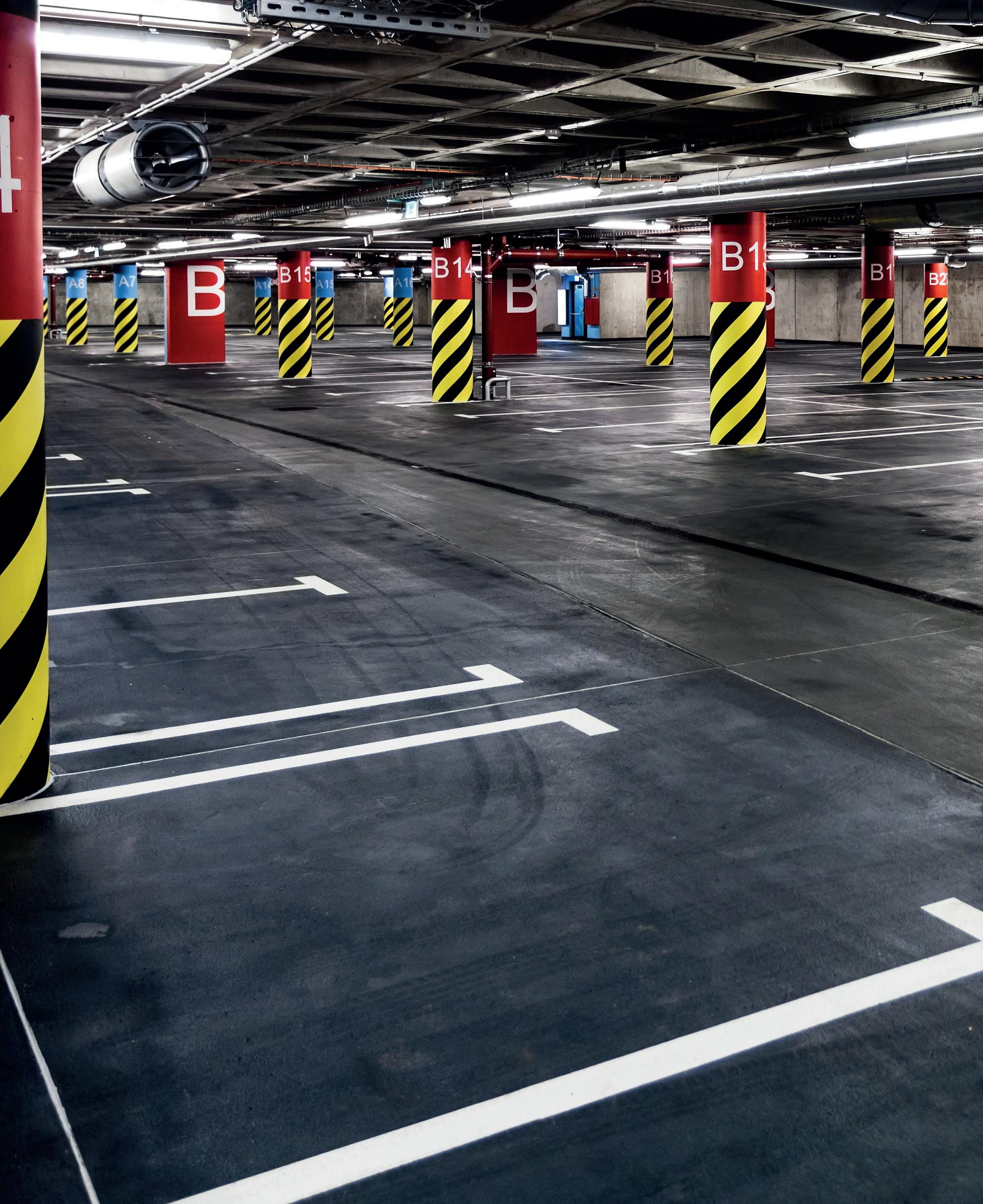

Fuel Duty was frozen and Air Passenger Duty increased on business class tickets, but transport and infrastructure investment barely featured in the Spring Budget statement made by Chancellor of the Exchequer. Instead, in what is an election year, Hunt focussed on delivering some heavily telegraphed cuts to National Insurance, revisions to the High Income Child Benefit Charge and the scrapping of tax breaks for wealthy ‘non-domiciled’ residents. The chancellor claimed his ‘Budget for Long Term Growth’ will deliver lower taxes, improve public services and grow investment, increasing the size of economy by 0.2% in 202829 and meeting fiscal rules. However, the chancellor had little to say on active travel, passenger transport infrastructure investment, nor regarding supporting the transition to electric vehicles (EVs).
Against a backdrop of concerns about the stresses being placed on local authority finances, day-to-day public spending will continue to increase by 1% higher than inflation on average over the next parliament, as the chancellor confirmed spending levels will not be cut. Hunt also announced a Public Sector Productivity Plan that will seek to improve public service delivery through using better technology to free frontline workers from time-consuming administration.
Fuel Duty has been frozen again, with the 5p cut in the tax paid on petrol and diesel, due to end later this month, kept for another year. HM Treasury said the average car driver will save £50 this year as the 5p cut and freeze to fuel duty is maintained until March 2025. The chancellor painted himself as a friend of the motorist. Following an aside about the cost of London’s Ultra Low Emission Zone (ULEZ), Hunt said: “Lots of families and sole
traders depend on their car. If I did nothing Fuel Duty would increase by 13% this month. So instead, I have listened again to my Right Honourable Friends for Stoke-on-Trent North, Dudley North, Witham and others, as well as The Sun newspaper’s ‘Keep it Down’ campaign. I have as a result decided to maintain the 5p cut and freeze Fuel Duty for a further 12 months. This will save the average car driver £50 next year and bring total savings since the 5p cut was introduced to around £250.”
The pausing of a move on fuel duty was welcomed by business and motoring bodies. Kevin Green, Logistics UK’s director of policy, said: “The extension to the 5p per litre cut in Fuel Duty announced by the chancellor in the Budget is good news for the logistics sector, at a time when the industry is facing increasing cost pressures from rising wage and fuel costs. Logistics powers every part of the economy, and an increase in operating costs at this time caused by the reversal of the Fuel Duty cut could have caused disastrous inflationary pressure on the economy. Maintaining the Fuel Duty cut will provide logistics businesses with more certainty as they drive the transition to a greener economy.”
Speaking for road hauliers, Paul Mummery, head of news and media at RHA, said: “We are pleased to see the chancellor has listened to our calls to help haulage, coach and van businesses in his Spring Budget. Continuing the freeze on Fuel Duty and maintaining the 5p-cut for a further 12 months will help firms deal with economic challenges.”
Looking at the Budget from the perspective of drivers, Steve Gooding, director of the RAC Foundation, said: “For all the focus on electric vehicles, 97% of cars on the UK’s roads run on petrol or diesel so the cost of filling up at the forecourt is a daily worry for tens of millions of people, not to mention businesses. This freeze is welcome but comes against a backdrop of oil prices, and hence pump prices, creeping back up over the past couple of months. Even as it stands the chancellor is still getting more than 50% of what drivers spend on the garage forecourt in vehicle excise duty and VAT combined.”
The AA’s head of roads policy, Jack Cousens, said: “Even with the intense pressure to balance the UK’s books, now is not
the time to rev up motoring costs for workers and families who rely on their cars to go about their daily lives – and stoke inflation. The AA therefore welcomes the 12 month freeze in Fuel Duty, despite the benefit felt being halved from its introduction.”
RAC head of policy Simon Williams said: “With a general election looming, it would have been a huge surprise for the chancellor to tamper with the political hot potato that is Fuel Duty in the Budget. It appears the decision of if or when duty will be put back up again has been quietly passed to the next government. But, while it’s good news that Fuel Duty has been kept low, it’s unlikely drivers will be breathing a collective sigh of relief as we don’t believe they’ve fully benefited from the cut that was introduced just two years ago due to retailers upping margins to cover their ‘increased costs’. This has meant fuel prices have been higher than they would otherwise have been.”
Silviya Barrett, director of policy and research at the Campaign for Better Transport, said she was disappointed but not entirely unsurprised. “It was rumoured that the chancellor would once again freeze Fuel Duty in a ‘boost’ to drivers, and the rumours were true. Well, sort of. The chancellor did indeed continue the freeze in Fuel Duty since 2011 and the 5p additional cut introduced in 2021 as a ‘temporary’ relief for high fuel costs –despite prices at the pumps long since returning to normal. But is this really a boost to drivers? By the government’s own admission, this would save the average driver only £50 across the year. However, put it all together, and maintaining the 5p cut and continuing the freeze on fuel duty will cost the Treasury a further £4.2bn in lost revenue over the next year.”
The Spring Budget contained no mention of cycling or walking, to the disappointment of Sarah McMonagle, Cycling UK’s director of external affairs, who said: “The government is repeating its long-running mistake of under-funding and short term thinking on sustainable transport. The National Audit Office (NAO) told the government last year it wasn’t investing enough to meet its own 2025 targets for walking and cycling, even before it slashed dedicated funding for active travel by two-thirds last March.
“This financial black hole, coupled with the stop-start nature of funding, is preventing local authorities from investing in cycling and walking schemes that we know create green jobs, boost economic growth and make our streets safer, in addition to the many health, wellbeing and environmental benefits.”
The Chancellor of the Exchequer has kept a 1% increase in dayto-day public spending above inflation, despite speculation it would be cut to just 0.75%. In his Spring Budget, Jeremy Hunt announced a Public Sector Productivity Plan which marks the first step towards returning public sector productivity back to pre-pandemic levels and will ensure taxpayers’ money is spent as efficiently as possible.
Backed by £4.2bn in funding, the plan aims to allow public services to invest in new technologies like AI, replace outdated IT systems, free up frontline workers from time-consuming admin tasks and take action to reduce costs down the line. The NHS will receive an additional £3.4bn as part of this plan to invest in new tech and digital transformation. This leaves £800m investment for non-NHS public services. HM Treasury said this will help deliver up to £1.8bn of benefits by 2029.
Hunt said: “Although spending has continued to rise every year, public sector productivity remains below pre-pandemic levels – by nearly 6%. This demonstrates that the way to improve public services is not always more money or more people – we also need to run them more efficiently. We need a more productive state not a bigger state. It’s not fair to ask taxpayers to pay for more when public service productivity has fallen. Nor would it be wise to reduce that funding given the pressures that public services face. So I am keeping the planned growth in day to day spending at 1% in real terms. But we are going to spend it better.”
The Transport Planning Society (TPS) was disappointed to see the chancellor overlook the role of sustainable transport in stimulating economic growth and improving people’s lives. In times of economic instability, sustainable modes can be crucial to connect people to jobs and education and often act as the only means of travel for the most disadvantaged. We would have liked the chancellor to focus on some of the points below.


Active travel was featured in our manifesto published last year. We called for investment into safe and secure active travel routes. It was disappointing to see active travel investment completely absent from the Spring Budget. Investment increases usage which in turn has a range of benefits:
• Encouraging active travel reduces emissions and supports our decarbonisation ambitions, set out in the Transport Decarbonisation Plan
• Active travel is the healthiest mode of transport and will have considerable benefits for public health, easing current pressures on the NHS.
• There are quantifiable economic benefits to active travel via increased spending in local business, reduced congestion and increased productivity. The Sustrans Walking and Cycling Index indicated active travel created £6.5 billion in economic benefits across society in the areas they surveyed.
When investing in active travel we must ensure the benefits are distributed equally across users. Recent research from the London Cycling Campaign highlights the abuse women receive while cycling. Furthermore, the infrastructure in London is far more advanced than in the rest of the country. Measures need to be in place to guarantee all users from all regions of the UK start to enjoy benefits equally.
We explored the importance of a strategic parking policy to complement the industry’s wider goals in our paper Just the Ticket! Parking Policy for Lower Carbon Travel. We would have liked the chancellor to adopt some of the initiatives we assessed, most notably workplace parking levies that have been utilised so effectively in Nottingham, to generate the necessary funding for transport investment and maintenance of existing assets.
The UK’s current economic situation requires certain economic levers to raise revenue. We would have liked the chancellor to consider the reinstatement of the Fuel Duty escalator. Freezing the Fuel Duty will forego at least £5bn per year, benefiting mainly the rich, who drive the most, and doing very little for the poorest in society, who don’t tend to own a car. IPPR analysis indicates the most disadvantaged drivers spend more than 20% of their income on running a car. Continuing the Fuel Duty freeze for another 12 months is discouraging but not surprising. But, if the chancellor wants to increase tax revenue and simultaneously reduce emissions and congestion reintroducing some form of the fuel price escalator would be very powerful. Any revenue raised could be reinvested into major infrastructure schemes which have been neglected since the cost of living crisis.
We were encouraged to see the chancellor increase air passenger duty for all non-economy flights. We hope this is a first step to incentivising sustainable forms of transport for all long-distance journeys where possible. Further measures could include the Campaign for Better Transport’s ‘Super Rate’ of Air Passenger Duty on private jet passengers. This is estimated to be able to raise roughly £1.4bn every year.
The chancellor’s budget overlooked how transport can tackle many of the economic burdens the country is facing. As we approach the general election the chancellor should offer the support and clarity the transport industry needs to grow, improve and decarbonise.
Tom van Vuren is TPS policy director
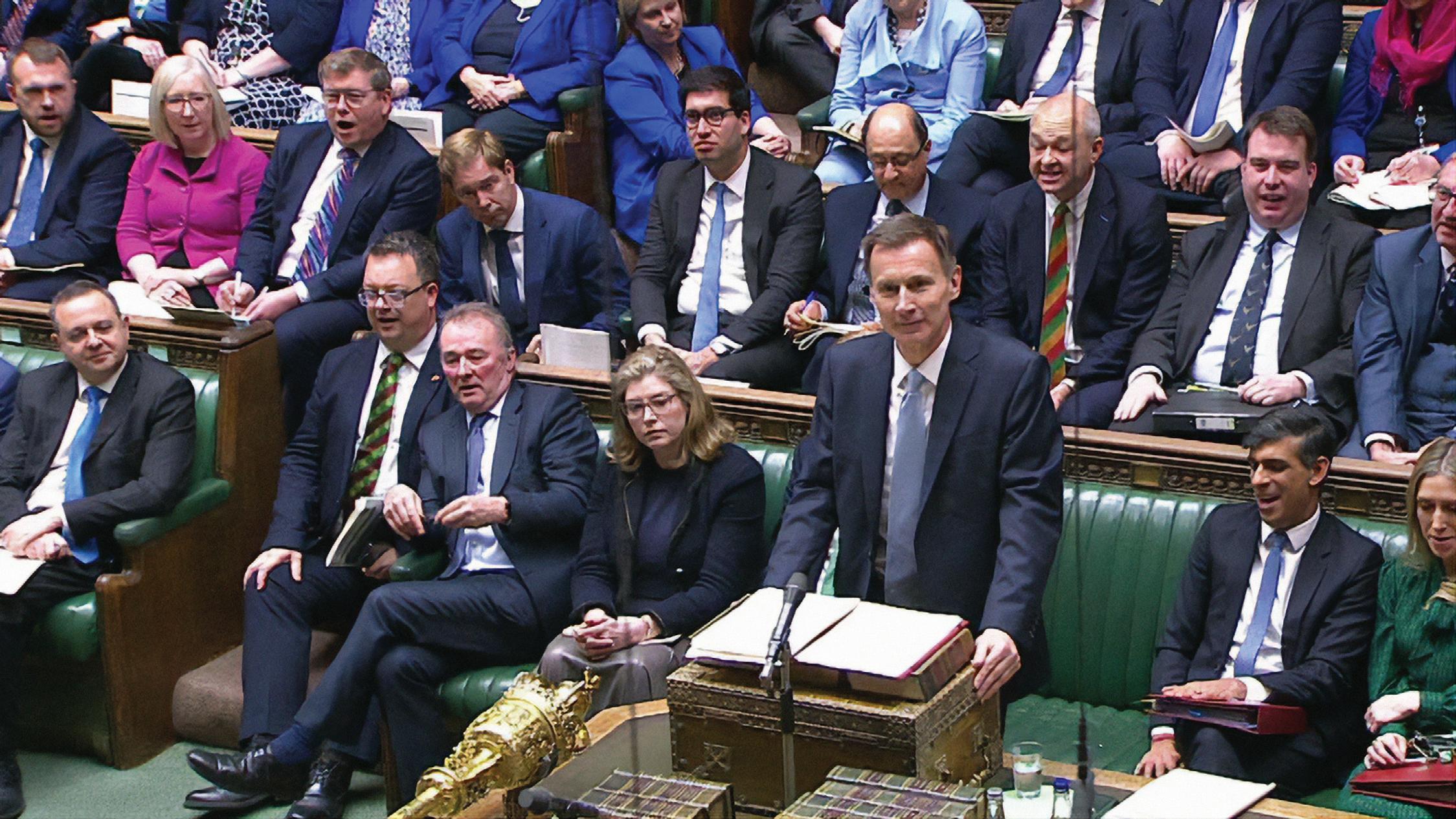
Advocates of electric vehicles (EVs) were disappointed by the lack of announcements supporting the transition to EVs in the Chancellor of the Exchequer Jeremy Hunt’s Spring Budget. Ahead of the Budget, the UK automotive industry had called for fairer EV taxation as fleets continue to drive growth, while private EV uptake declines.
The Society of Motor Manufacturers & Traders (SMMT) had argued a faster, market transition depends on more private buyers switching but the lack of significant incentives is holding back many. The SMMT had seen the budget is an opportunity for the chancellor to stimulate demand by halving VAT on new EVs for three years, amending proposed Vehicle Excise Duty (VED) changes, and reducing VAT on public charging in line with home charging. While consumers do not pay VAT on other emission reduction technologies such as heat pumps and solar panels, private EV buyers pay the full 20% levied on all cars, whether they be electric, petrol or diesel.
SMMT chief executive Mike Hawes, expressed his disappointment: ‘The Budget is a missed opportunity to deliver fairer tax for a fair transition. With both government and industry having statutory requirements to deliver net zero, more still needs to be done to help consumers make the switch.”
The lack of action to equalise the VAT paid when charging at public terminals and at home disappointed Quentin Willson, founder of the FairCharge campaign. He said: “‘FairCharge is staggered that the chancellor is prepared to spend £5bn on a Fuel Duty freeze and continuation of the 5p cut, yet won’t spend 125th of that – circa £40m – on cutting the VAT on public EV charging. Drivers may not see the 5p cut passed on at the pumps but chargepoint operators say they would pass on any reduction in VAT directly to consumers. And cutting VAT on public charging could save EV drivers up to £1,300 over 10,000 miles, helping them with zero tailpipe emissions. Why wouldn’t you support a
drive for cleaner air in our towns and cities? Might it have something to do with an election, we wonder.”
James Taylor, managing director of car manufacturer Vauxhall, expressed the automotive sector’s sense of frustration. He said: “The Spring Budget has not delivered the acceleration needed to stop the UK’s transition to electric vehicles from stalling. If we are to meet the rightly ambitious targets laid out in the government’s Zero Emission Vehicle mandate (80% of all cars sold to be electric by 2030) then there needs to be incentives for private car buyers to make the switch to electric as there are in the majority of European nations.
“Vauxhall will already offer its entire car and van line-up as electric by the end of this year and has a number of highly competitive offers available but we cannot drive demand alone. Whilst there are strong incentives for company car drivers to make the switch to electric – including for those choosing luxury vehicles –the private buyer who wants a more attainable small or family car receives nothing.
“Furthermore, if you can charge your electric vehicle at home with off-street parking then you will pay 5% VAT on your electricity. If you don’t have a driveway and rely on public chargers then you will pay 20% VAT on your electricity. We support the FairCharge campaign for a fairer taxation on charging. We would call on the chancellor to urgently set up purchase incentives to stimulate the electric vehicle market and review the unfair taxation on public charging so that the UK isn’t left behind in the race to more sustainable motoring.”
James Court, chief executive of EVA England, an association for electric vehicle owners, was also disappointed. He said: “This year’s Spring Budget is a missed opportunity by the government to support an EV sector that is on the cusp of mass uptake. Without targeted schemes to make EVs more affordable for the average consumer, all of our immense progress so far risks failing to hit the mark of our rightly ambitious net zero targets. Highly successful social leasing and targeted grant schemes are being implemented elsewhere, incentivising yet more drivers to make the switch, and this government has failed to keep up with this momentum.”
The SMMT’s Mike Hawes says consumers need confidence to make transition to electric vehicles
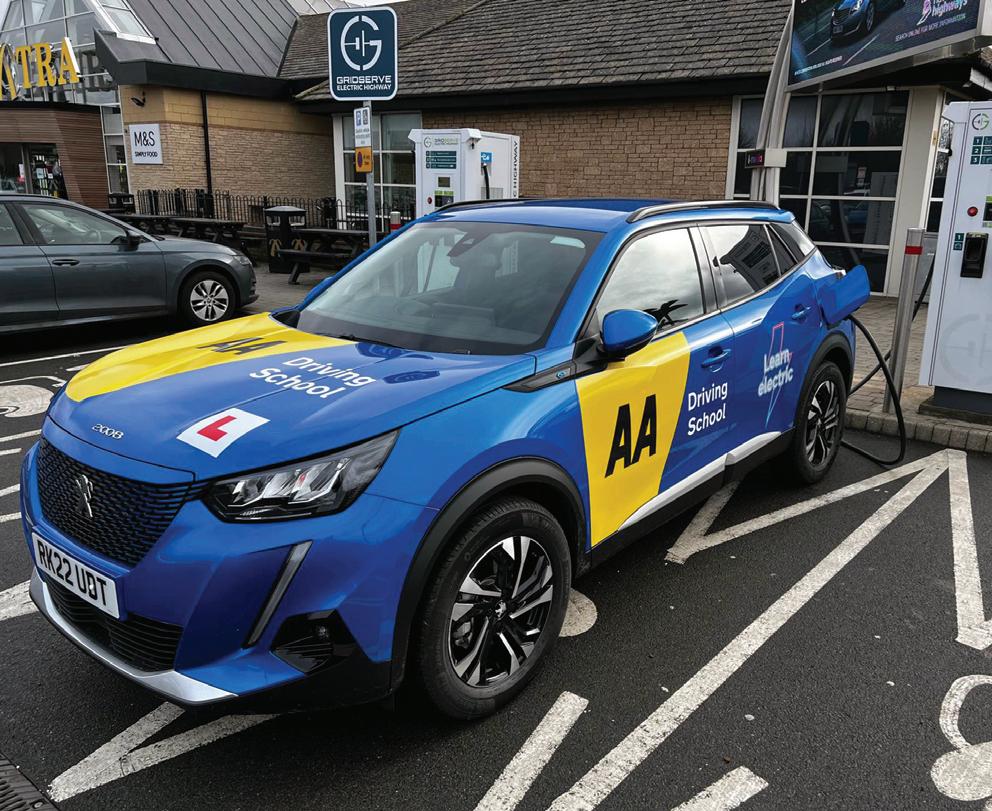
The AA welcomes the chancellor’s decision not to increase fuel duty for a further 12 months, even if the benefit has halved from £100 in 2022 to £50 now.
Higher motoring costs, whether fuel, maintenance or insurance, are generating substantially higher VAT returns for the Treasury. Petrol now at 145p a litre, compared to the prepandemic average of 123.2p (2017-2019), now includes 3.7p more in VAT.
Petrol at the current 145p and diesel at 153.5p a litre are prices that were unheard of before Covid-19 and the Ukraine war. Were it not for the 5p fuel duty cut (6p with VAT) in March 2022, the burden on workers and families who need their cars to go about their daily lives would be even worse.
Taxed at more than 50%, road fuel costs are already a major financial penalty for having to commute by road because trains have become unreliable, buses in many rural areas non-existent and soaring housing costs often force people to live further away from where they work.
Higher fuel costs already benefit the Treasury with a bigger VAT return. Between 2017 and 2019, petrol averaged 123.2p and returned 20.5p a litre in VAT. At 145p a litre, it returns 24.2p a litre. With every tank, typically holding 55 litres, the chancellor is already getting £2 extra with every fill-up.
Road fuel prices are currently at levels unheard of before the pandemic – even with the 5p fuel duty cut (6p with VAT) in March 2022. More people have been forced into their cars by unreliable trains, reduced bus services and higher housing costs sending them further away to cheaper areas. Councils are ramping up parking costs, even sometimes taxing city workers with a Workplace Parking Levy, to fill holes in their coffers.
Even with the intense pressure to balance the UK’s books, now is not the time to rev up motoring costs for workers and families who rely on their cars to go about their daily lives – and stoke inflation. The AA therefore welcomes the 12-month freeze in Fuel Duty, despite the benefit felt being halved from its introduction.
However, The AA is disappointed that the chancellor did not review Insurance Premium Tax (IPT). This levy on responsible motoring, has added such a financial burden on car ownership, especially younger drivers, that it’s estimated that a million people drive without insurance. It’s not only illegal but it adds unnecessary costs and worry to every law-abiding driver.
Similarly, not equalising the VAT on public charging of EVs with domestic charging is a missed opportunity to encourage more car owners to switch to an EV and contribute towards the UK goal of net zero.

The Spring Budget represents a missed opportunity to jumpstart the mass electric vehicle (EV) transition amid slowing demand for privately bought EVs. After consumer confidence in the EV transition was damaged by last September’s mixed public messaging, and with manufacturers now under an ambitious mandate to sell growing proportions of electric vehicles, the industry was looking to the chancellor to implement a package of fiscal measures to stimulate demand.
A fair transition is ultimately what will underpin mass EV adoption, with the current higher cost of making and therefore selling EVs – plus consumers already feeling discouraged by the ongoing shortage of public charging infrastructure – presenting major barriers.
SMMT figures for new car and van registrations published this week reflect markets in which overall EV demand is rising, but entirely attributable to the fleet and business sectors thanks to their fiscal incentives. Delivering net zero, however, requires a whole market transition, but with private buyers accounting for fewer than one in five new EVs registered so far in 2024, every lever must be pulled else government and industry targets are put at risk.
Britain is the only major European market with an end-of-sale date and a prescriptive market regulation, but no private EV incentives. While incentives are available for Britons to buy other mission-critical, net zero tech such as heat pumps and solar panels, electric vehicles are afforded no such support. That’s why industry has called for fair and cost-effective measures for decarbonising road transport.
The most important measure – and the one to which consumers would most respond – is a temporary halving of VAT on new EVs for three years, saving the average EV buyer around £4,000 off the upfront purchase price, while costing the Treasury less than the early adopters’ Plug-in Car Grant. This measure alone would put more than a quarter of a million additional EVs on the road – all substitutional purchases for fossil fuel alternatives.


Moreover, considering EVs are essential and not a luxury for decarbonisation, excluding them from the expensive Vehicle Excise Duty supplement (due to come in next year) is another common sense move that warrants serious consideration. At the same time, if the transition is to be a truly fair one, the VAT ‘pavement penalty’ must also come to an end; reduce VAT on public charging so that EV drivers pay the same amount of tax per kwh of energy as they would do charging at home.
Mike Hawes is chief executive of the Society of Motor Manufacturers & Traders (SMMT)































Overlooking the importance of well-maintained parking facilities could have a damaging impact on a business’s reputation, warns a new report. The study by car park renovation specialist WJ Group shows that nearly two-thirds (63%) of UK drivers said that poor line markings and surface quality or line markings negatively affect their opinion of an organisation.
You Can’t Park There found that nearly a third of the 501 drivers surveyed believed they had been put in danger by a lack of clear instructional markings. More than two-thirds said they felt unsafe when a car park has poor surface quality or damaged lines.
Research shows that more than 150 car models are now too big to fit in average parking spaces, yet the size of a standard bay in the UK has remained static for decades. The You Can’t Park report thus explores the impact that the trend towards using larger cars is having on parking attitudes. The research found sports utility vehicle (SUV) drivers were almost twice as likely to consider leaving a job due to inadequate parking facilities. This group were far more concerned with clear lines, while over half of respondents driving SUVs said a lack of clear spacing had affected
their mental health, making them more anxious to park.
WJ explored the attitudes of different generations of workers and consumers. More than nine in 10 drivers under the age of 35 (91%), for example, said they would consider more time in a retail park if the car park feels safe.


You Can’t Park There suggests that the base economic impact of good public parking is also clear. More than twothirds of all drivers surveyed (70%) said they would spend more time in a retail park if the car park felt safe.
The importance of good parking for businesses keen to see employees return to the office is further underlined when looking at the age splits. One in three people aged between 33 and 44 said they would be deterred from commuting if their workplace had poor parking facilities. Three-quarters of drivers aged under 35 said they would consider a more expensive public car park if the surface quality and line markings were better kept.
Wayne Johnston, chief executive of WJ Group, said: “With more pressure than ever to ensure facilities are filled and offer a place where people want to work, the report explains the negative impact neglected car parking facilities have on encouraging people back to the office. With hybrid working and
increased expectation of employees, facilities managers are under more pressure to ensure people make best use of the organisation’s buildings. The results of our survey highlight the importance of well-maintained car parks to an employee’s working environment and their overall happiness – which may come as a surprise as it is something that is perhaps not often considered.”
As well as providing full analysis of the survey results, WJ’s report offers tips and advice on how to maintain car parks within increasingly tight budgetary constraints. These include standardising approaches across multiple sites, developing a proactive maintenance schedule and taking advantage of cost-effective solutions, such as surface repairs and refreshed line markings.
Johnston added: “On the surface, it’s easy to understand why parking facilities might be neglected, yet our survey findings show that it is having a negative effect on visitors. Add in the fact that car parks are often the first touchpoint for anyone visiting an organisation, the issue can no longer be ignored. This year offers facilities managers and building owners with an opportunity to refocus their attention on car parks. WJ is experienced in creating and implementing maintenance plans and our report offers advice that provide tangible goals on improving parking infrastructure.”

Designers have been drawing up visions of how to market luxury cars in imaginative ways. The Future Luxury Retail Design Competition is a global contest that challenged architects and designers to define the future of luxury retail.
Through the competition, Dezeen magazine and Bentley sought to explore changes currently taking place in the luxury industry and discover forward-thinking ideas for both digital and physical retail experiences of the future, in and out of the automotive world.
The contest received entries from over 145 contestants from more than 33 countries around the world. The judging panel shortlisted 15 proposals. The top three entries were Ultra’s site specific temporary pavilions to showcase Bentley cars, BeExperience’s mobile showroom that would visit customers and Meredith O’Shaughnessy’s reimaging of the car parks so they become showrooms and test tracks.
The Crossing, the project devised by Meredith O’Shaughnessy, sets out how disused multi-storey car parks could be repurposed to become a luxury retail and entertainment spaces in which people can check out the latest upmarket car models.
O’Shaughnessy’s proposal features a whiskey bar where guests can enjoy honey-infused cocktails, as well as an exclusive section for media and VIP guests to explore Bentley’s material innovations. Another floor would include a high-tech speaker room that doubles as a listening booth as well as a concert venue to highlight Bentley’s dynamic in-car audio technology. A driving track would extend around the building and onto the roof, with visitors able to select from a range of settings that would simulate scenic landscapes using projection mapping.
The Future Luxury Retail Design Competition judging panel comprised Chris Cooke, head of design collaborations at Bentley Motors, visualisation artist Charlotte Taylor, Halleroed co-founder Ruxandra Halleröd and Parisian concept store Colette co-founder Sarah Andelman, as well as Max Fraser, editorial director of Dezeen magazine.
The jury said of The Crossing: “The concept of reutilising car parks was the real hook. We liked the way the concept responded to the aesthetic of the car park in a futuristic and aspirational way. A car park is something that’s normally so grisly and horrible that you want to get out of it immediately. This proposal flips that on its head in an inventive way.”
The winning entry, Ultra, received a top prize of £15,000, while the runner-up BExperience received £10,000 and the third-placed The Crossing received £5,000.


The Crossing comes from ‘criu’, an old Welsh word and the origin of the name of Bentley’s famous home, Crewe. With this name, Bentley celebrates the shift from historical legacy to a sustainable future. The design incorporates sustainability at every stage. Using the innovation developed at the Dream Factory in Crewe, solar panels power the entire structure, while the heart of the building showcases pods filled with vegetation nourished by recycled water systems.
A distinctive feature of the concept is the driving track. Customers will choose pre-set programmes that adapt the track to create an immersive personalised grand touring experience epitomised by the Continental and Bacalar. This allows first-time luxury customers to create a visceral emotional connection and to feel the joy of being behind the wheel, without going to an intimidating race track or using busy public roads.
The exclusive top floor CriuLAB offers insights into Bentley’s material innovations, allowing customers to connect with the brand’s sustainable vision. Highlights would include myceliumgrown leather and haptic experiences with seats made using MotorSkins, which are robotic fabrics embedded with fluidics that hug the body.
The Crossing aligns perfectly with Bentley’s pledge towards sustainability by repurposing existing urban concrete structures in city centres around the world. Each floor is designed to work as an individual experience that can be replicated across the world from the US to Japan, where The Crossing will be adapted for local tastes. By marrying grand touring experiences with ecoconscious urban settings, The Crossing represents a stride towards a greener future, proving that luxury and sustainability can coexist, and emphasising that sustainable decisions form the pinnacle of true luxury.
Meredith O’Shaughnessy is chief executive and wizard of the Meredith Collective and is global head of brand experience at Aston Martin Lagonda

The first-place winner of the competition was Finnish design agency Ultra for its proposal called Bentley Intercontinental Pavilion. The concept envisioned invite-only, temporary pavilions situated in select locations around the world that would showcase models from an imagined range of Bentley cars called Intercontinental. Each pavilion would be designed to reflect the distinct context of its location and would be built by local craftspeople using local materials.
Customers invited to the pavilion corresponding to their desired model’s origin would collaborate with local artisans to make final selections on the details, materials and finishes of the car, making use of locally sourced materials.
An augmented reality (AR) experience within the pavilion would facilitate customers in envisioning their customised vehicle.

Second place was awarded to Daniel Czyszczon for BExperience, which envisions autonomous mobile showrooms driving to customers’ locations, negating the need for physical showroom visits. Specially designed test vehicles would be equipped with digital displays showcasing an array of materials and finishes for customers to test without the need for physical samples. The autonomous feature of the vehicles would enable customers to seamlessly test drive the car while journeying to different locations, providing an expeditious alternative to current retail models.
Third place was awarded to Meredith O’Shaughnessy for The Crossing, which would see disused car parks in urban settings repurposed into luxury retail and entertainment spaces.
As a nod to the building’s previous function as a car park, The Crossing would feature a meandering driving track that envelops the building and extends onto the roof, mirroring the spiral ramps commonly found in car parks. A driving track would enable visitors to be able to choose from various settings to simulate picturesque landscapes using projection mapping, enabling customers to envisage driving on scenic routes.
Businesses and retailers can prebook loading areas on a busy south London high street as part of the Walworth Road kerbside management project.
Loading bays across two areas on Walworth Road will be managed via the Kerb Platform to support the loading and unloading activity of local businesses and retailers.
The project, a partnership between Grid Smarter Cities and Southwark Council, manages existing bays in a structured manner and will provide the borough council with key parking data. The scheme will run for an initial 18 month period with the possibility to implement the bookable bays permanently after that. There are currently no charges to use the bays.
Enforcement on bay usage commenced in late February.
A key priority for Southwark is to give delivery drivers on Walworth Road better access to the existing allocated loading bays and deter unauthorised


usage of the spaces for non-specific loading or unloading activity.
The aim is to reduce congestion in the high street during peak periods and alleviate parking stress during deliveries to the local businesses and eateries. The bays can be used for 24 hours a day, enabling freight operators to deliver to local businesses with greater flexibility.
A HGV specific bay has also been deployed for larger freight vehicles on the north side of the street, helping to serve deliveries to the nearby supermarket.
Cllr James McAsh, cabinet member for the climate emergency, clean air and streets, said: “We’re proud to introduce London’s first kerbside management scheme. The bookable loading bays on Walworth Road will tackle congestion and improve traffic management, a key tenet of our Streets for People strategy. This practical solution will help ensure smoother operations for delivery drivers and shoppers while supporting local businesses. This is an important step towards a greener borough.”
Businesses offered route to sustainable car park management Mobilityways, a provider of employer commute emissions solutions, is working in partnership with permit management system Octopass.
The companies are offering a car park management solution designed to streamline parking permit allocation and which encourages sustainable travel decisions. The partners say employers implementing the car park management solution will be able to configure a seamless workflow between car park permit application and issuance, car-share validation and parking enforcement.
Organisations will be able to provide all employees who would like to apply for a permit with their own Personal Travel Plan (PTP). The system’s automatic analysis of each PTP will determine the availability of viable sustainable commuting options, taking into consideration factors such as home address, personal circumstances and shift patterns. Viable active travel, public transport and/or car-sharing options will be explored, creating a tailored commuting experience for each staff member.
Employers can decide to only issue parking permits to staff willing to car-

share, or staff who have no viable alternative commuting method besides driving. Those willing and able to car-share might be given priority parking bays.
The integration with Mobilityways’ Liftshare to Work app facilitates connections between colleagues, matching car-share options based on proximity and similar working hours, and verifying that users are car-sharing. Once car-sharing arrangements are established, the system monitors the number of shared journeys completed by the car sharer each month, providing ongoing authentication of permits for those meeting prescribed monthly quotas.
For businesses operating in offices with limited parking spaces, there are clear benefits of car-sharing. Mobilityways says encouraging solo commuters to share rides effectively doubles parking capacity –
Southwark previously partnered with Grid Smarter Cities at Bankside in the Southbank area, as part of Kerb Dock, a river-based docking project involving bookable loading bay spaces for delivery fleets adjacent to Bankside Pier. The council was keen to deploy bookable loading bays in a busy high street location.
Neil Herron, chief executive of Grid Smarter Cities, said: “Grid Smarter Cities is excited to be launching our latest bookable loading bays on a high street in Walworth Road, Southwark, a UK first. The Kerb app enables commercial drivers to book their slots in signed ‘permit’ loading bays which help better manage freight, servicing and delivery activities at the kerbside.
“This is an exciting change from the first come first served approach to kerbside access, and represents a major digital leap forward for councils to optimise kerbside management and for operators to undertake deliveries in a more efficient manner leading to beneficial air quality, congestion reduction and improved local amenity.”
transforming 100 spaces into 200. This initiative not only contributes to a greener commute but also optimises parking resources for the benefit of the entire workforce.
Mobilityways, which works with over 700 companies, operates a car-sharing platform called Liftshare.com.
Julie Furnell, managing director of Mobilityways, said: “Quite apart from alleviating the shortage of car parking spaces and the potential costs involved in issuing more permits than organisations need, large companies are looking hard at ways to reduce their carbon footprint.
“Decarbonising the employee commute should now form part of any company’s Scope 3 emissions reduction efforts. And the commute to the office remains the least efficient journey we ever make. It contributes over 18 million tonnes of CO2 every year – five per cent of total UK emissions.”
Developed by Mobile Worker Plus, Octopass is a software as a service (SaaS) application, deployable in any region and compatible with any cloud infrastructure provider. Paul Marjoram, chief executive of Mobile Worker Plus, said: “Sustainability is one of our core values and aside from our continuous efforts to reduce our own carbon footprint as a company, our mission is to also help our clients get closer to net zero, through sustainability-specific features within the Octopass platform.”
Metric develops card payment station for London borough
A card payment scheme has been launched across 13 car parks and seven ‘park and shop’ locations by the London Borough of Hounslow.
A six-month trial of the terminals will add card payments to the existing PayByPhone parking app and in-person payments using cash or a card at more than 200 PayPoint retailers across the borough.
The new terminals were designed specifically for Hounslow by Metric Group.
The units are slightly closer to the ground than standard machines, making them more accessible for wheelchair users.
The terminals allow users to select their language of choice with all the most commonly spoken languages in Hounslow available.
The machines require users to enter their vehicle registration to validate their session.
The system automatically cal-
Motorists across Oxfordshire now have a choice of parking payment apps following an expansion of on-street coverage by the county council. Having trialled the ‘open market’ model at one location, Oxfordshire County Council has now added all of its remaining 43 on-street locations, including the historic university city of Oxford.
Payment can now be made by either cash or card at pay & display machines, or by app via RingGo, JustPark, PayByPhone and APCOA.
The open market is enabled via the Department for Transport (DfT) funded National Parking Platform (NPP). A pilot involving a number of local authorities has proved successful. As a result, the government has committed to moving from the trial phase to a nationwide roll-out from this Autumn.
RingGo believes enabling drivers to make cashless payment choices based on their personal preferences –whether in terms of price, quality or value-added services – will encourage competition

their-kind contactless parking payment terminals.
“The council took the decision to go cashless back in 2016 to prevent vandalism of machines holding cash.
“Whilst the vast majority of residents successfully adopted the move to PayByPhone, with approximately 35,000 parking sessions booked per week, it is absolutely vital that all our residents feel digitally included.

culates the correct tariff for each individual vehicle, accommodating free on-street parking for Blue Badge holders, as well as 30 minutes’ free parking sessions at park and shop locations, and lower charges for less-polluting vehicles.
Cllr Salman Shaheen, cabinet member for recreation, public spaces and parking, said: “I am pleased to say that today we have launched our new first-of-
between providers, incentivise innovation and improve user experience.
Peter O’Driscoll, managing director of RingGo, said: “It’s great to see further uptake of the open market model in Oxfordshire. The future of parking involves increased choice for motorists, and the NPP can provide this in the palm of your hand. It has the power to revolutionise parking. The pilot schemes taking place across the UK clearly show that a national roll-out of the NPP and a move to an open market model will bring significant advantages to local authorities and motorists.”
Emma K Liptrot, senior officer at Oxfordshire, said: “RingGo has seamlessly facilitated Oxfordshire’s transition to the NPP, simplifying access and enhancing efficiency, paving the way for a smarter, more sustainable future. As the uptake of digital services increases across the UK, we expect many more local authorities to make the switch to this new parking model.”
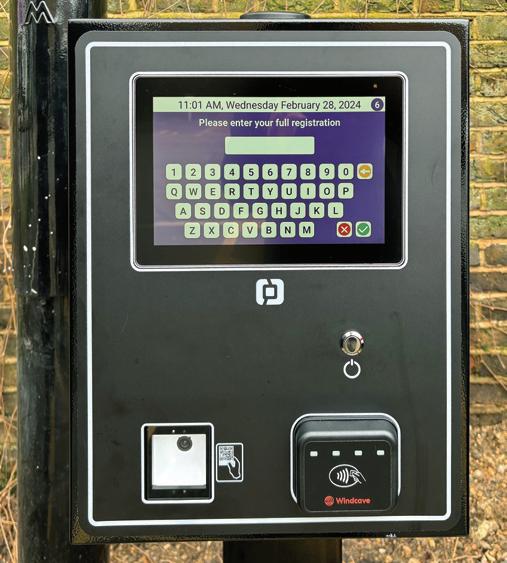
“That is why we have introduced the ability to pay by card on the street as well as by phone to support residents who were not able to use the app or phone.
“I am pleased that these new machines are both accessible to wheelchair users and available in all the languages most commonly spoken by our residents.
“Hounslow is a listening council and if we need to adapt policy to better serve our residents, we do it. I want to encourage users to share their feedback throughout the course of the trial, so we can look at this and the data we collect, to make an informed and resident-led decision about taking it forward.”




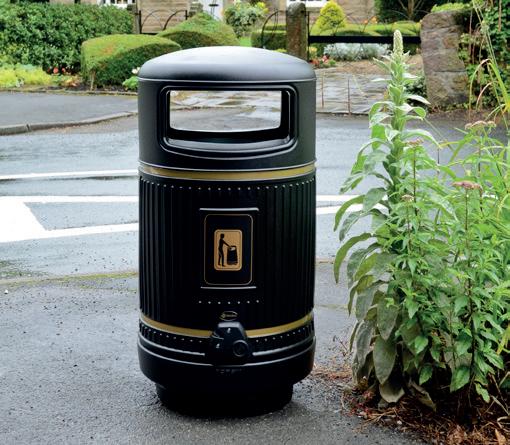
Two new bookable bays have been launched in central London. The service will enable freight EV’s to pre-book loading and unloading space in advance for up to 90 minutes.
The bays are on Abbey Orchard Street and Russell Street near the bustling shopping and business districts of Victoria Street and Covent Garden.
The project is a collaboration between Grid Smarter Cities, which is providing the Kerb booking platform, including driver app, and Westminster City Council. The bays are bookable 24 hours per day.
The key aims for Westminster City Council are to improve the access and dwell times of freight operators in the area and reduce congestion. A pre-booked slot will also lead to reductions in idling and search time from freight vehicles and a more efficient delivery process.
It is hoped the ability to book longer delivery slots ranging from 30, 60 and 90 minutes will also encourage more onward deliveries by greener modes, such as by foot or cargo bike.
The scheme supports Westminster’s Freight, Servicing and Deliveries Strategy and Action Plan 2020–2040, which includes proactive kerbside management as one of its strategic actions, including: more effective use of on-street loading; and unloading bays throughout the

an account and payment via the Kerb Platform is necessary. The bays are charged at local parking rates. Drivers who wish to use the bays must be pre-registered and the vehicle must be fully electric. The bays can be used for 24 hours a day enabling freight operators to deliver to clients with greater flexibility.
The bays are enforceable by Westminster City Council’s parking regulations team.
24-hour period to reduce commercial vehicle movements.
Cllr Paul Dimoldenberg, cabinet member for city management and air quality, said: “We are thrilled to be partnering with Grid Smarter Cities to deliver two new dedicated parking bays for freight EVs in Westminster – London’s first bookable EV loading bays. Westminster City Council recognises the importance of tackling air pollution
and reducing carbon emissions to reach our goal of a net zero city by 2040.”
The scheme is set to run for an initial 18-month period.
Westminster Council is funding the project, with Grid Smarter Cities providing the booking platform, two on-street e-ink signs, driver app and powering technology. Both bays will be experimental traffic orders.
The bays are chargeable and
The technology will enable delivery drivers to book loading bay slots for longer periods of time of up to 90 minutes. Drivers can also report rogue vehicles if the space is being used without a booking on arrival.
Neil Herron, chief executive from Grid Smarter Cities, said: “Grid Smarter Cities is excited to be launching our first bookable EV only loading bays in the heart of London with Westminster City Council. The Kerb app enables commercial EV drivers to book their slots in signed ‘permit’ loading bays which help better manage freight, servicing and delivery activities at the kerbside. This is an exciting change from the first come, first served approach to kerbside access.

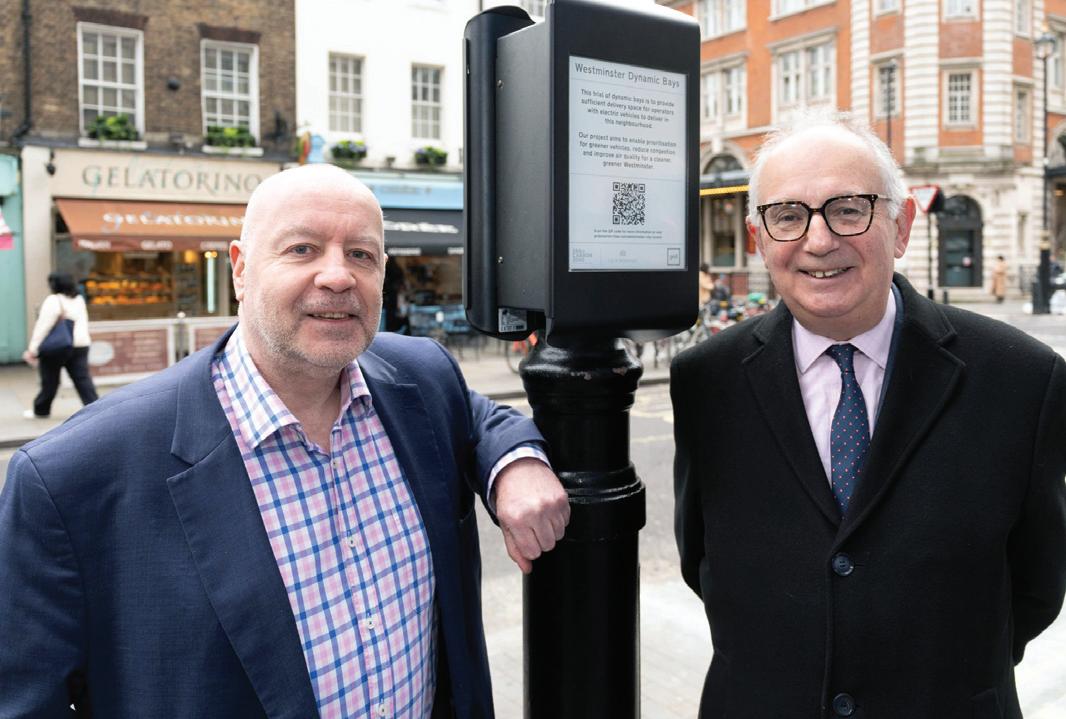
Home EV charging start-up Kerbo Charge has secured investment from angel investor Deborah Meaden on the Dragons’ Den TV show. The funding will be used to help roll out Kerbo’s pavement EV charging channel across the UK.
The through-pavement charging channel was presented in episode 7 of season 21 of the BBC show.
The Kerbo team presented their product to Dragons Peter Jones, Deborah Meaden, Touker Suleyman, Sara Davies and Steven Bartlett. Co-founders Michael Goulden and Ben Whitaker said they devised the charging channel after becoming frustrated with the lack of suitable charging options for EV owners without a driveway.
These households need to trail a cable over the pavement which can create a tripping hazard for anyone using the
walkway or travel to a public charging point.
Residents insert their charging cable into the channel and the self-closing lid snaps shut behind, eliminating the trip hazard.
Deborah Meaden recognised the problem this is solving and invested £50k to help the business make the product available across the UK. The company currently has live trials in eight local
“The deployment represents a major digital leap forward for councils to optimise kerbside management and for operators to undertake deliveries in a more efficient manner and aligns with Westminster’s Carbon Reduction Strategy and Air Quality Action Plan helping prioritise carbon reduction through reduced traffic and congestion.”
authorities with many more in the pipeline.
Meaden said: “Local authorities have an impending massive problem that is going to cost a fortune. This is a very costeffective way of dealing with this driving issue and there is a lot of cash around for solving these problems. You have a legislative drive, you have a lot of cash available. You’ve got a perfect storm.”
Ben Whitaker of Kerbo Charge added: “The Dragons understand just how challenging it can be to introduce a new product and change people’s minds about what is possible. We hope that with their help we can persuade local authorities to approve more installations, and terraced home-owners that there are now solutions to let them charge their EV’s cheaply at home so that they make the switch to clean vehicles more quickly.”
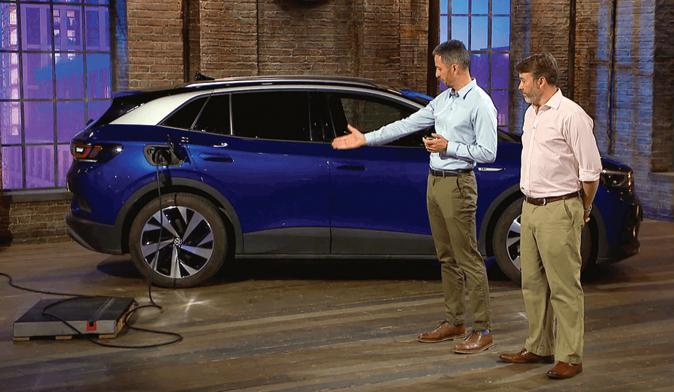
The Kerbo channels are manufactured in the UK.
3ti sets up a Papilio3 unit in Inverness
hospital car park
A solar-powered electric vehicle charging hub has been created for NHS Scotland at Raigmore Hospital in Inverness.
The Papilio3 pop-up solar car park provides hospital users with access to 12 charging points boosted by renewable energy.
The system will support destination and workplace EV charging at the hospital, which has a fleet of EVs already in operation. It will also meet a growing demand for EV charging at a destination where long dwell times are common.
The solar car park has been designed, installed and funded by 3ti, which will operate the facility.
Brian Johnstone, head of energy, environment and sustainability at NHS Highland, said: “As part of our commitment to supporting the delivery of healthcare in the future, we understand that our environmental responsibilities go beyond
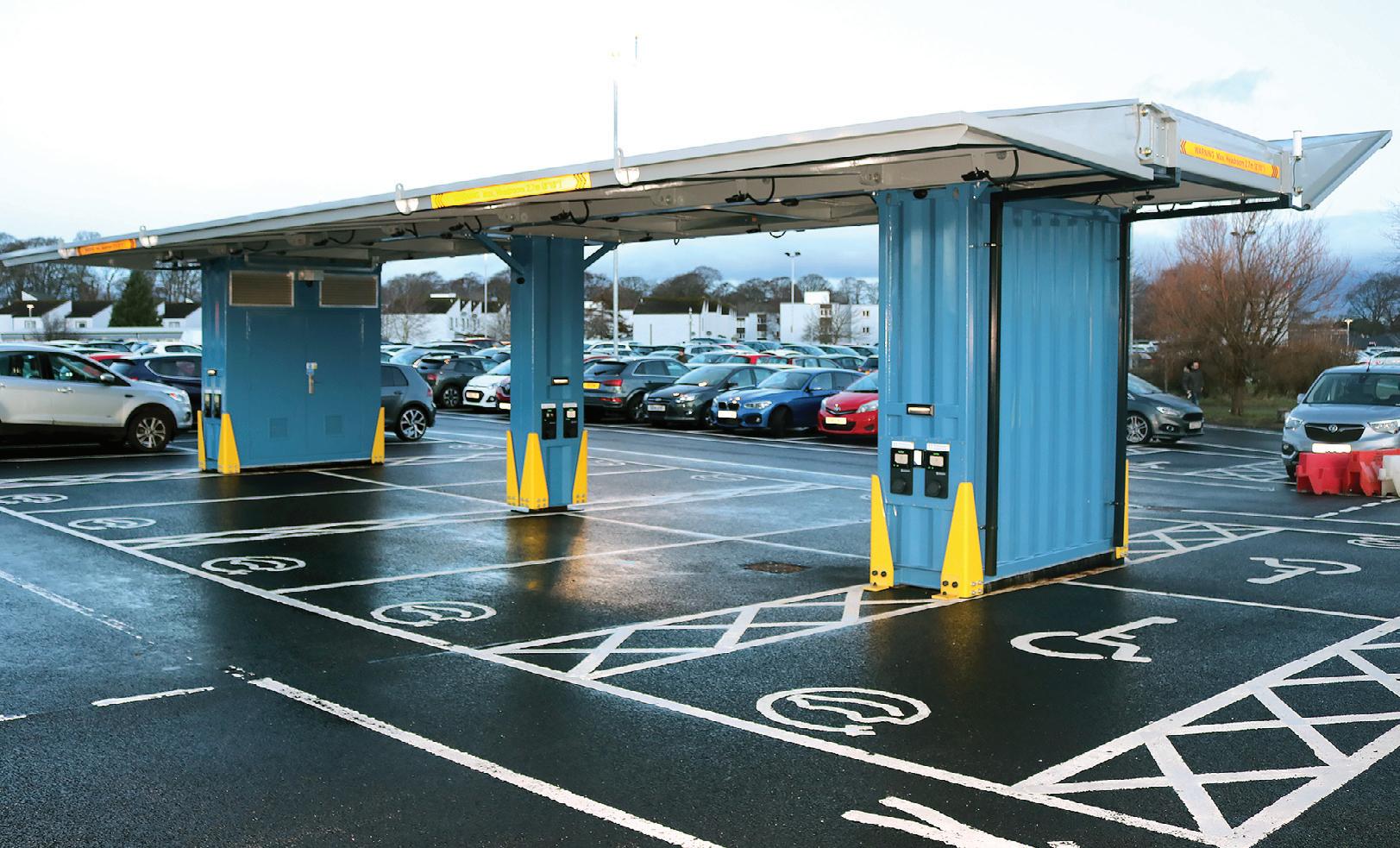
our own services. As an organisation, we are looking to develop innovative ways to harness electricity and utilise renewable energy on-site which Papilio3 is a great example of.
“With the introduction of Papilio3, NHS Highland is now better positioned to support patients, staff and visitors with
Compleo, a supplier of electric vehicle charging solutions, has unveiled its new high-power charger. Features include userfriendly design, easy installation, compact slimline build, and exceptional power efficiency.
The eTower 200 has the capability to deliver 200 kW ultra-fast charging for two vehicles simultaneously. The chargepoint’s power distribution system ensures power is shared where it is needed most. The unit’s seven power modules balance power distribution to both vehicles, depending on each EV’s charging curve and state of charge, ensuring efficient charging at greater than 96% efficiency.
The new unit features an integrated payment terminal, chip & PIN pad, and a bright all-weather display to ensure accessibility for all users following German standards.
With a pre-installed wire hub, the eTower is designed to be easily lowered by forklift onto the hub, eliminating the need for cranes or complex

wiring processes.
The cabinet’s slimline profile, with a 2-metre height, has been designed for spaceconscious areas such as multi-storey car parks or backto-back installations.
External LED strips enhance accessibility and usability by making the unit visible from a distance while acting as charge indicators.
The eTower is a low noise unit. Operating at 55dB at a 1metre distance, the charger is suitable for residential use without causing disturbance due to an air ventilation system which keeps electronic components unaffected by dust and humidity.
EVs at Raigmore. We hope that this investment in EV infrastructure helps to convince others to make the switch over to zeroemission vehicles.”
The Papilio3 system is built around a recycled shipping container and can be installed in
Papilio3 will generate on average 18MWh of electricity annually – which equates to over 63,000 miles of EV range – and can fast charge up to 12 EVs simultaneously at 7, 11 or 22kW.
Papilio3 is available from 3ti on a rental contract so it requires











































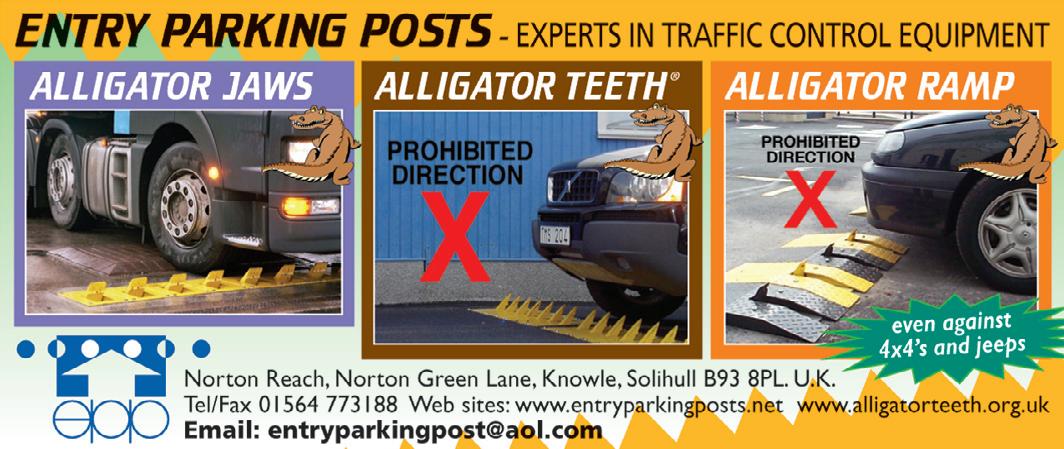

•
•
•
•
•
•
•
•
•
•
•
•

Services

Contact:
harry@parkingperspectives.com
www.parkingperspectives.com

The Leading Independent Consultancy for all your parking solu琀ons
Established in 1991, with over 230 sa琀s昀ed customers comprising both public and private sector (including Local Authority and Health and Educa琀on establishments). Quality parking solu琀ons provided by our experienced in house specialists:
GIS mapping and surveying
• MTO site surveys and digi琀sing.
• On street TRO signs and lines: legality and condi琀on surveys (sample surveys also available).
• GIS mapping of TRO surveys, produc琀on of digital maps and TRO management for Order wri琀ng, upda琀ng and consolida琀on.
• Data extrac琀on and conversion of text based schedules to digi琀sed map based solu琀ons.
• Length of stay, usage, and occupancy parking surveys, both on and o昀 street.
• Compliance surveys and data analysis.
• Surveying and mapping of infrastructure assets.
Contact:
Peter
Tel: 01492585055 or 07900264137
Email: plowe@rtaassociates.co.uk
Consultancy services
• Financial appraisal and e�ciency reviews of parking service provision.
• Collabora琀ve working – joint no琀ce processing and shared enforcement.
• On and O昀 street tra�c regula琀on order wri琀ng.
• DPE and CPE feasibility studies and implementa琀on.
• Tari昀 reviews.
• DPE/CPE services speci昀ca琀on wri琀ng and tender evalua琀on.
RTA Associates Ltd
www.rtaassociates.co.uk

Lauren Appleby (North)
Shaun







